#but the fact that it works so well as foreshadowing for the greater narrative of hinata's journey is INSANE furudate ily
Explore tagged Tumblr posts
Text



look at this small funny comedic moment from chapter 4 (!!!!) where hinata works himself so hard that he makes himself sick. definitely still humorous and fun on a second read through and totally doesnt evoke any strong emotions in me about self care or knowing your limits, nope this is fine. i'm fine.
(i cut out some of the panels in between to make this moment more obvious for the purposes of showcasing my point for this post, but in those panels kageyama's inner monologue about hinata's greatest weapon being his drive to keep going no matter how tired he is is so wildly good, especially contrasted with how that exact weapon is immediately what makes hinata sick here)
#im positive that furudate wasnt thinking ahead to the end with this and it was truly just meant to be comedy with some realism here#but the fact that it works so well as foreshadowing for the greater narrative of hinata's journey is INSANE furudate ily#hq!!#hq meta#hinata#hq manga spoilers#hq!! manga spoilers#the sun also sets#haikyuu manga spoilers#haikyu!! manga spoilers#haikyuu!! manga spoilers#haikyu manga spoilers#2024 rewatch#<- separate tag from the 2021 reread tag#which will make sense once i start actually posting my 2024 rewatch posts that im currently stockpiling lol#this is still volleyball#hq#x
11 notes
·
View notes
Text
I've said this once, and I'll say it again, framing Armand as 'wanting Louis and Claudia dead' or 'planning their murder' makes 0 sense with any context the show provides us.
This still means he's 100% complicit (!!!). In fact, the very idea he could've prevented it at all puts the onus on him pretty highly. Compounded also on the fact that, as his lover, he had special obligations to Louis that he neglects by doing this, and the matter of racist intent that's involved in this that everyone's obligated to stand against on principle. Not to mention this is murder. Suppose one could say the very conditions set by the coven make one easily groomed to complicit-ness, but this is simply yet another explanation for things there's never any real excuse for (Don't be like Armand and try). But, it also begins to highlight why it's not a very good read of his character to blanket this as his sole doing, and as his desire at all to do. As it would completely ignore Santiago's much greater role in perpetration (Being the leader in creating, with the other coven members, the context for the complicit-ness to occur), as well as not considering the role the Laws, and ultra-violent dynamic of the coven, played into what Armand decides on. It ignores the whole narrative.
The option presented to Armand surrounding the trail was never his own making. The choice to take part in it at all is actually a lack of choice, because it doesn't actually concern his own choice in it. (Basically, he wouldn't ever come to it himself or willingly. Making it not validly consensual). It's likely as well the only reason he's directing it is because he'd know how to. He hadn't chose that part either, and frankly never really had to begin with. This is all especially true under coercion, or threat of violence - yes, even if he could act against it. The point is whether a victim of it believes there is threat, or that there could possibly be one, not whether it actually ever posed a real one.
When it comes to choice between the Coven or Louis, they exist as more options towards opposing obligations than anything else, and neither outcome, as he sees them going, is what he would actually choose were he to have a choice in it. Which he doesn't. (No one can choose outcomes, only predict them.)
Except, Armand could've created a choice for himself, but didn't. He could've found a way to prevent it, but didn't. He chose his own choiceless-ness, over making the potential for something he'd always prefer - and so would be a real and consensual choice - but didn't, because he didn't feel he would be able to have it the way he wanted. Paradoxically trapping himself into doing something he doesn't want, because he can't have what he wants. He not only becomes choiceless then, but wantless. Total self effacement. Reinforcing an enslavement that is now false. Living in Mauvaise foi - bad faith. (The Sartre cameo was foreshadowing of this exact thing.)
Perhaps he does this because he's become incapable of letting himself have that level of self, or awareness. Letting others decide his fate for him is all he can accept, when this is the only kind of self he knows. And/Or because the far worse option was simply the only one he could have any greater certainty in the outcomes with. There is also still the threat posed by a united force of the coven as well. This all points to Armand already being very easy to coerce into it, fact, he'd already been heavily coerced when he was groomed repeatedly to all this centuries prior.
The thing to understand though is he was never going to actually come to the trail, let alone having ever wanted Louis' demise, when what he really wanted was Louis all along. Only because there's an opposing threat presented to him, does he actively work against himself as he doesn't see to any alternative. (And Claudia was always a footnote in all this to him, a literal footnote in history, so wouldn't have factored into his decision much... don't read into this also being a footnote. RIP Claudia, miss you dearly.)
Also in coming to this choice-less decision, he knows nothing can prevent the coven from turning their backs on what they've already set their hearts on doing. They'd mutinied to get this. And, he knows as well he can't force Louis to love him, or for this matter, love him forever.
In having to decide on something, he appeases the thing that threatens him the most, which is the coven. And with a mere feeling of a threat from Louis, his obligations to him are taken as only thereafter fleeting. Though this doesn't mean he'd stopped loving him. Simply stopped acting out the biggest obligation to someone you do love - which is keeping them safe, and alive, if you can help it. (He is in love; doesn't act in love). So no, this doesn't mean he wants or orchestrates what the coven is forcing him to do - this makes no sense. But that, within the dynamics of the coven, which have changed to be against him, and the laws they seek to uphold with this change, there is a high-controlling obligatory threat to violence he must also accept to eliminate all threat to himself. Real or not.
Now, how real that threat is with his decision, is granted not the most plausible in a physical sense. (and factor that he could've come to a plan with Louis and it would be doubly true.) - but if you consider Armand as someone who wouldn't know how to fair well without other people, or at least desperately not want that, there's a certain level of threat still to suddenly becoming very isolated. And more importantly totally alone. This is the main threat to him, really. If he had, let's say, made a plan to run off with Louis, and he were to then leave him down the line, this would be a threat to him in the same way as losing the coven would. The coven provides a security that Louis could not in this sense - but it's just that. A security.
It's very: siding with an abusive parent/guardian because at least they provide a sense of some protection, or dare I say mercy, on you. Even when they're completely opposed to your wants/needs/autonomy.(etc.) (Notable etc. - he'd been fucking them all for years, like the lack of metaphor is so striking.)
He does end up making choice for himself in the end though, and that is resurrecting Louis + not saying the truth to Louis. He chose this WAY too late, but it's probably when outcomes started to change from how he thought they would go that he realized the errors in his thinking. That, given this, he also would never have known if Louis would leave him. And so rescuing Louis from this was an option the whole time to avoiding threat, if he had just seen he could've had that. That he could've had what he wanted and just chose that for himself. Even up to the very moment.
He's tragic in this way, but you almost don't want to view him like this because he'd reaped all the rewards over choices he never made. Choices he would've made if he were (... well, Lestat), but really a more self-respecting person who actually understood the thing he wanted, [love], and the trust it takes to have that. Because Armand chooses to lie, or obscure truths, he sets this relationship up to always have inevitably broken on lack of trust.
He is a perpetuator of manipulation, and does do things which mimic the neglectful and highly-controlled kind of abuse the coven was offering him, and past abusers were inflicting on him as well. Once he's to himself, with only an obligation to himself and to Louis as a companion - as was his want and choice - he therefore takes full responsibility for those choices he makes. He can't just be complicit in those things. You might almost want to excuse (not forgive) what comes before it, because the choice wasn't of his autonomous consent, and he was highly susceptible to fall into it - and for Louis I think he does (technically it's only his right to do as well*) - but even Louis can not excuse for things Armand of his own volition chose to do.
Because Louis has some self respect, and does understand love requires trust, he had to end things there. The fact Armand still wanted to fight for it anyway says a lot about his own development throughout all this time, and how it's not moved very much forward from where it started. To end off, I would think this sets him up for a lot of growth in later seasons. He's literally hit a wall, and has to now redirect his life.
*When I say 'technically' it's Louis right for the purposes of respecting this is fictional media this right only naturally extends to the community Louis represents: [Black people, Black queer men, Black abuse survivors, etc.]. These people do not have to side with Louis excusing it, and that should be respected always more than Louis own excusing of it wrt the shows text. In other words, there's no excusing it except through Louis eyes. That's how that has to work.
#armand#the vampire armand#amc iwtv#iwtv#interview with the vampire#iwtv season 2#iwtv meta#iwtv analysis#louis de pointe du lac#loumand#out here armand posting again#I swear I can post about other characters I'm just armandpilled at the moment a hyperfixation will do that#please let it be clear to everyone this is not a defense of his actions please I was fairly clear there's no defending it#but Marius when i get my HANDS ON YOU
46 notes
·
View notes
Text
I saw a take that said the family dynamics between team red (especially shadowsan + carm) are somewhat exaggerated by fandom and there's not actually a lot in canon that supports a lot of popular head canons or attributed roles. And it's like, first of all, please keep your hurtful truths to yourself. Second of all, I'm probably going to need a read more.
Despite myself, I really cannot disagree with the points made by this particular poster. It's a sound argument. Carmen Sandiego (2019) is an adventure series. It's fast paced, action packed, and focused a decent amount on edutainment. This is understandable, this is after all, the point of the franchise as a whole. The characters have enough sustenance that they are likeable, though they are most noticeably flat.
I'd argue that Shadowsan and Devineaux are the most dynamic characters, but even then the handling of their respective character arcs leaves something to be desired. Much like the rest of the series, their storylines feel rushed and added in as a second thought. I get the impression that the show was envisioned simply as an adventure of the week type of thing. They had a premise and a gimmick and they wanted to run with it. This is fine. But then came the overarching story lines and... Well. There were no master pieces.
We'll take season one as an example. The first two episodes were pretty solid. They had a coherent and well executed story line supported by characters with personality and potential for growth and depth. The pilot episode of a series serves to set up character arcs and overarching themes without having to go too into depth because of the fact that it's simply the beginning. The first two episodes of this series fulfilled their purpose, and they were executed well. I will even be generous to the rest of the season's story line and say that there did seem to be at least the minimal amount of foreshadowing and groundwork laid for the twist at the end of the season.
The problem then comes into play with the remaining episodes. From episodes three to eight, the story line is episodic and self-contained. There's a formula and it works well without there necessarily being a greater need for depth. I was perfectly invested simply with the caper by caper formula. It was never thought-provoking for me nor did it need to be. It was just a bit of fun. And then came the final episode and it was... interesting! I was pleasantly surprised by the sudden inclusion of an overarching story line, if not scratching my head a little.
Shadowsan's reveal made a decent amount of sense in hindsight, but didn't come across as particularly expertly crafted. It was a sudden shift to the status quo with little build up, and it felt vaguely out of place. It's an episode that could have been executed better if the narrative had started to shift earlier in the season or if there were more episodes between "The Chasing Paper Caper" and "The French Connection Caper." Instead it's everything all at once and I found myself thinking, "Oh! Okay! So we're doing this now."
Upon rewatching, there is some build up that can be noticed and recontextualizes, but it's not much. Even knowing how the season concludes, episodes 3-8 still feel episodic and disconnected from any greater story line. You've got some angst about Carmen's origin, and Shadowsan's insistence about sending Tigress for a second time reframes itself as a calculated decision rather than misjudgment but that's about it. They have the bare essentials of story telling, but they're not skillfully crafted. And that's... fine! This is children's TV. I don't actually hold it to the same standard as adult television, and I do think it's a pretty decent show for what it is.
My point then that I want to address is this idea of bare essential story telling. Carmen Sandiego doesn't lack the elements needed to tell a good story. They're there, just not expertly executed. The post that inspired this spiel mentioned that Team Red reads more as friendly coworkers. I don't fully agree with this, but I see their point. I will also say that I don't think this was what the writers had in mind. I do believe they were meant to be read as Found Family, in fact, it is more or less explicitly stated in "The African Ice Caper." It's just that, like every other aspect of the show, it's handled in a way that gives hints of further depth while not fully conceptualizing the theme.
This is not a smear campaign against the series. No, this is very much a product of passion. It's an entertaining show with beautiful animation and captivating fight sequences. I was hooked from the first episode and I continued to be so through the end of the series. I'd say one of the greatest draws of this show lies in its weakness. We're only given impressions of characters' further depth and personality. With the obvious exception of Carmen, we're only given glimpses of characters'back stories. In regards to over arching story lines, we're only given bare bone elements. This isn't great from a critical standpoint, but it does open the door to a large array of fan interpretation and transformative fanworks.
Because of the flaws in canon, fans are not bound by strict limitations. They are free to come up with their own unique interpretations of characters, they can flesh out back stories however they see fit, and otherwise flimsy storylines lend themselves to deeper fan-driven exploration.
Frequently on Tumblr, you'll see posts that disparage fanon for the way that it tends to flanderize and flatten characters. And yeah! This is bad! Unsurprisingly, flattening complex stories into easily recognizable tropes and clichés is actually the devil! A lot of times in fandom, you see this sort of corporate brain rot that simplifies stories into familiar and easily consumable pieces of "media" ("Consuming media," my beloathed)
Fanon gets a bad rep. Is it deserved? Mm. A good majority of the time, maybe. But where is the discussion for fanon in the other direction? What about when fanon expands a work of fiction? When it assigns more complexity than canonically given? There's something innately human about connecting with a piece of fiction and wanting to do more. We don't so easily let go of things, you know? When you love a piece of art that's otherwise disappointing, you have this desire to see it do better. To meet its potential. I think that's where fanon in the opposite direction stems from.
I think the fandom surrounding Carmen Sandiego (2019) is a decent example of this. The characterization is admittedly lacking, but that's done nothing to stop fanartists from coming up with their own rich interpretations of characters and their relations to others.
Carmen and Julia are two characters that share a decent amount of screen time, but their relationship otherwise suffers from the amount of time stretching between interactions. This has done nothing to deter fans. It seems I can't throw a stone in this fandom without hitting beautiful pieces of fanart depicting the two, or multi-chapter fics exploring the two's dynamics, or impassioned ramblings about them.
The same thing can be said about Graham and Carmen. They share a decent amount of screen time and their interactions are compelling, but they're too far and in between. What's there is not fully developed. Again, bringing it back to the idea of bare essential story telling. They have what they need to hint at the intrigue of both these dynamics, but they're not satisfactorily executed and both relationships suffer as a result. Their relationships, and indeed, the show as a whole, kind of feels like a completed puzzle with various missing pieces.
I chose Julethief and Redcrackle to use as examples, but similar things can be said of every other relationship in this show. Player and Carmen have moments that hint at a dynamic friendship built on unwavering trust and care, but it's only in a few select scenes, (though, the scenes that do do this are phenomenal and make me want to cry-- and I'm so sorry shippers-- but Player and Carmen have a monopoly on the hard hitting emotionally impactful moments in this show. I don't make the rules, I'm sorry.) and the majority of their interactions are reserved for getting down to business.
However, because of the glimpses we do see, you see countless fics detailing their friendship and building on to what we see in canon by going behind the scenes. I myself have extensive head canons about these two and honestly, what I've written and published is only the tip of the iceberg. Player is a bit of a tricky character to get a grasp on because of his limited role in canon, but what we do see opens up all sort of interpretation. I have such a fun time writing him because I can use what I see in canon to shape my own ideas about how he would act in various scenarios. My version of Player is far more dynamic than what we see in canon, but it's only like that because I love the canon character so much. I want him to do more, I want him to be more. My creativity is piqued with this character.
Moving on, let's focus on Shdowsan and Carmen, my other beloved dynamic. I have so many ideas about these two's relationship, and I especially enjoy delving into the dynamic between him and Black Sheep. They suffer the same problems as prior discussed. The scenes building on their relationship are sparse, but they are there. Take for several examples:
Shadowsan interacting with little Black Sheep in the "Daisho Caper," Shadowsan's stated remorse at not being able to tell Carmen about her own family, Shadowsan nursing her back to health after "The Stockholm Syndrome Caper," his stated motive for hiding the truth of her lineage from her, Shadowsan telling her he'd be with her till the end of the line, Shadowsan reminiscing about little Black Sheep when he visits the destroyed VILE Island, Shadowsan's dedication to finding Carmen's mother for her, Shadowsan telling her she can finally rest, and, and, and, and.
There is certainly a reason that fans have interpreted he and Carmen as being father and daughter, and I am in no way surprised by the beautiful and extensive explorations that certain fans have taken into these two's shared history (@frozenwolftemplar my beloved)
After all, you really do have to wonder about the hardened assassin who couldn't bring himself to harm a child or her father. Could there have been more done on the show writers part to really cement their relationship as adoptive father and daughter? Yes, absolutely. Does the development of their relationship leave something to be desired? Yes, absolutely. Do the existing interactions inspire me to delve further and call up melancholy memories of me and my own father, thus making me want to extensively detail their shared history before expanding on their present relationship so that I can process my own feelings about my own father? Yes, absolutely. Is this type of connection a deeply valuable faucet of story telling and kind of the whole point of creating art to begin with? I think so!
Carmen Sandiego doesn't necessarily set things up just to drop them so much as it strives to create compelling story lines and interesting characters before ultimately failing to delve deep enough or dedicate enough time for these things to fully come into their own. They're there and they exist, but it's like... Drinking water with oranges in it. I can taste the oranges, but damnit, now I want orange juice.
It utilizes story telling techniques, but not enough so that the show fully benefits from them. There's an impression of character dynamics, back stories, and personality but they're not fully recognized.
However, it is because of these flaws that fans can take the source material and go absolutely bonkers with it. By engaging with the story and characters, you really get the chance to flex your creative muscle. It's like a sandbox. The sand is there, the box is there, and the tools are there, but what you make is up to you. I've seen some deeply moving pieces of writing come out of this fandom, and it's insane to me how some authors can do so much with so little. In engaging with fanworks for this show, I've drawn connections to my own life and my own relationships. There are lines of writing that have been engraved into my brain. I've met wonderfully creative people and I'm glad to be an active member of the community.
No, the show itself is no amazing piece of story telling. It's fun and it's entertaining, but it doesn't fully realize everything that it set out to do. It does, however, open the door to community as well as inspiring creativity and transformity, and that means the world to me.
#god damnit i did it again#when will i stop dedicating hours of my life to hand wavy analysis of my niche special interests#suzie speaks#carmen sandiego 2019#carmen sandiego netflix
36 notes
·
View notes
Text
Spoiler-heavy thoughts about Crick and how the Game Mechanics treat Temenos’s story
So. yeah if you press ‘Keep Reading’ I should probably let you guys know that these thoughts are just a tiny bit unhinged. And again - spoiler alert! You’ve been warned!!
GAME MECHANICS AND UI
- Gonna preface THIS section by asserting that yes, not EVERY mechanic needs to be taken apart under a microscope and re-contextualized into the greater lore of the game. Not EVERYTHING has to mean something to everybody. Some of my classes in game design disagree though and honestly for the genre that Octopath Traveler is, that being a story-heavy role-playing game where the narrative is half the game, I'd say that integrating lore into the mechanics and vice-versa wouldn't hurt - in fact it ENHANCES the experience. The second game does this pretty handily through the EX Skills (the first of the skills being Divine Blessings, and the second being earned at the end of the story.) and the Latent Powers.
Okay the Latent Powers? Honestly that part's mostly for Hikari. Shadow's Hold/Light's Radiance is STILL one of the best examples of Gameplay and Story Integration that this game has
No I swear I don't have a bias for 'other selves'/'deep parts of yourself made manifest' what are you talking about -
I swear I can write an entire separate post JUST about the EX Skills. Mostly for Osvald, Castti, and mOTHERFUCKING TEMENOS AGAIN
aND THIS IS WHY I GO FUCKING BONKERS WHEN I THINK ABOUT THE DEMO VERSION OF THE GAME LIKE WHAT THE FU-
- Literally the fucking emblem for Temenos's story is a staff and a sword over the Sacred Flame like - they REALLY want you to know how important Crick is to this tale
- tHE FACT THAT CRICK IS THE ONE WHO HAS COVER. NOT EVEN HIKARI OR THE WARRIOR CLASS. IT'S CRICK - DOES THIS COUNT AS FORESHADOWING???
I'll like - write here what I should have written in the bath - and that's me being like 'oh it's because he's recklessly protective. OH SHIT IT'S BECAUSE HE'S RECKLESSLY PROTECTIVE'
I fully acknowledge that it doesn't have to be that deep. MAYBE I'm pulling stuff out of my ass. But allow me to go bonkers over Crick and his for-some-reason-worryingly-appropriate moveset
Man I wonder how bonkers I'd go over Malaya if she was allowed to throw hands. I want her to complement Castti's moveset so bad
- Also the fact that both of their kits complement each other. Crick's bulkier build was made specifically with supporting Temenos in mind.
My guy's Sacred Sword reduces the enemy's elemental defense. Wonder if that implies that the Sanctum Knights normally work with magic and/or magicians
aGAIN HE HAS FUCKING COVER which is PERFECT because early-game Temenos can and will faint if a monster blinks at him too hard
Then there's his OTHER skill Godsblade's Shield which RAISES his physical defense to SO HE CAN COVER FOR TEMENOS BETTER LIKE. AT SOME POINT I SHOULD JUST ASK WHY THEY TRIED SO HARD FOR HIM SPECIFICALLY
And I mean. It makes SENSE but I don't think any of the other helper characters really had this level of chemistry in their mechanics as these two do
Emerald and Gus both have healing moves for better survivability considering how squishy Osvald and Agnea are
And it makes sense, Temenos already has access to a healing move because he's a cleric
The thing that separates Crick from them is that neither Emerald nor Gus really have moves to further support their leads on the level that Crick does. Emerald is fast and he breaks well and Gus is clearly meant to be the DPS of Agnea's Chapter 1, but again - Crick has moves tailor-made for Temenos to go off and do his thing
You lose Pirro and Scaracci/ Rai Mei and Ritsu after the intro and none of them really complement the Throné and Hikari and vice versa as much as Crick and Temenos do with each other
The difference with them too is that they have established relationships with their lead characters prior to the story, sometimes even encountered as antagonistic forces
Pirro, Rai Mei, and Ritsu are all bosses that were once considered close comrades of Throné and Hikari
Scaracci displays mutinous traits throughout Throne's Chapter 1
Emerald subverts this by acting mutinous - which, his conflict with Osvald amounted more to a sacrifice of goodwill
He knows Osvald and how he acts even prior to the beginning of Chapter 1, so he's in this category of having an established relationship
Gus averts this completely by just being a genuinely supportive part of Agnea's life
Mechanically, you never have anything to do with these characters again past Chapter 1 - save for Rai Mei and Ritsu being bosses. Hikari's companions also play an integral narrative role in his final chapter, with Ritsu being encountered as a boss again for the final time
Crick is a subversion of all of them in that he doesn't have any direct relationship with Temenos prior to Chapter 1, and though we never use him as a helper character ever again he consistently shows up as an integral part of Temenos's story up until his death in Chapter 3: Stormhail
Weirdly Crick is also the only one out of all of them where the use of Path Actions is required more than once - Osvald has to Scrutinize Emerald at one point
AND GODDAMNIT OF COURSE THE FIRST AND LAST TANGIBLE INTERACTION WE HAVE WITH CRICK IS TO FUCKING GUIDE HIM I'M SO MAD ABOUT THIS BOOKEND IT'S SO MEAN AKSJKAS
And this in itself makes complete sense given that he has larger roles to play outside of Chapter 1 - just not in the same vein as Ritsu or Rai Mei, but the fact is that Temenos's story is VERY good at establishing and building up chemistry between its characters
bUT FOR MECHANICS WE NEVER HAVE TO USE AGAIN AFTER CHAPTER 1?? THEY WENT SO HARD AND I WANT TO KNOW WHY
- It's not as big of a deal as it looks but I also find it funny just how much fun the devs seemed to have with Crick's introduction and entry into the party - using the Path Action to fucking TROLL with him.
- ON THAT NOTE, LET ME FREAK OUT OVER GUIDE AS A PATH ACTION A LITTLE MORE
I saw a post on Reddit earlier about the 'summoning townspeople' Path Actions and it kind of shook my world a little, so I'll just put my response to it here
For a guy who makes it a point to tell people not to follow anything blindly it's INCREDIBLY hilarious to me that Temenos's Path Action is getting people to follow him blindly.
MECHANICALLY, it's because he's the designated cleric. Temenos has Guide, because Ophilia has Guide. But thematically it's interesting to think about just how antithetical it is to his central creed of doubting, and how this specifically applies to Crick.
I did go back and check and yeah - Crick's one of three individual people I was able to find over the course of the stories that has a required Path Action used on them more than once.
Malaya is one other example with Inquire, and she even one-ups him with one use of Soothe. And I'll get to HER when I get to Castti's essay - I mean infodump - because it's like. Somehow even MORE heartbreaking than this instance of Guide
While I'm here I'll also mention Roque, who also has two instances of a Path Action used on him, namely Purchase and Hire in Partitio's Chapter 5
But back to the dramatic aspect of it it's like. I really want to shake the devs because it's so mean of them to have Temenos's relationship with him begin by guiding him towards not only the cathedral but to a healthier way of thinking, and to end with Crick's fucking GHOST leading Temenos to the crucial truth that he's lost so many people to find, including Crick himself
- I won't scrutinize everything about the cleric class itself but I WILL talk about the EX Skills, because to me it's ironic just how mean they are. I'm glad that the irony isn't lost on the fanfic writers like I see you guys use these as fanfic titles - bless you all
First - Prayer for Plenty, the sequel's answer to how absolutely fucking broken Saving Grace was as a passive in the first game. Limiting it to JUST Temenos's natural moveset feels like it should be sending a message honestly - it's a way to prolong the lives of his comrades and he couldn't do that for the ones he held dear in his own story. Can't help but feel like the fact that this is the one he gets from AELFRIC'S SHRINE rubs salt in the wound - no pun intended -
Secondly is Heavenly Shine and it's like. It's a holy nuke filled with divine power that drains Temenos's magic reserves completely. He invokes Aelfric's name when he uses it to and to this day I think the reason it feels cathartic to use is because it feels like a manifestation of Temenos's wrath
Unlike Osvald's own magic kamehamehadouken nuke where he learned it out of a need to protect Elena, Temenos learns this AFTER his story - and maybe it's just my concern speaking but man I really want this to represent his sheer need to go absolutely fucking apeshit like my man is NOT in a good place after his story is done
- This is the part where I go into the tinier, 'definitely stretching this past the realm of MATTERING' details that actually have something to do with the game mechanics
Some of Temenos's class lines are reminiscent of Crick's own. We've drawn the comparison with Temenos's Sweeping Cleave line already and it's adorable
Temenos Sweeping Cleave [insert handshake emoji] Crick Sacred Slash: I'll cleave you in twain!
Reaching even further here. His lines for Lux Congerere and Sacred Effulgence also somewhat invoke Crick's declaration of 'cleaving the shadows from this world', but it's not exact and I'm just indulging
Lux Congerere: Banish the shadows from this world!
Sacred Effulgence: Aelfric, banish the shadows from this world!
I'd also be extremely remiss to NOT mention the recruitment of Ort in postgame and it physically hurts me to summon him because of the way he says 'I will avenge you, Crick!' like DUDE. Oh well at least he's grieving healthily
Sacred Slash brothers let's gooo
There's like. No way that I'll be able to fit all of this in my other thoughts about Crick that are dedicated mostly to his and Temenos's arcs so. It's like not even in a ship sense anymore even if I do think they're fruity as hell
Honestly I'm just glad to get this all out of my system EXCEPT THERE'S MORE, because Temenos's story loves to torture my brain and its themes resonate with me a bit TOO much
#octopath#octopath traveler 2#temenos mistral#crick wellsley#vir rambles about octopath yet again#this time - FOR WAY LONGER THAN IS NECESSARY#these aren't even like half the overall thoughts i have about crick#let alone TEMENOS#i honestly don't know why it matters to me this much#it's kind of scary lmao#this is why i should talk to people more#shoutout to jae for some of the lines here because there really was no better way of putting it#temenos why are you such a STICK#ot2 spoilers
92 notes
·
View notes
Note
Hi. What are your thoughts on Lady Nagant? Personally i believe she was handled rather badly.
My usual apologies, first off, for letting this sit so long, anon! Holiday season means I've been cramming giftfic writing into every spare waking moment, and I knew answering this was going to be a rant. This is, in the end, perhaps not as meticulously organized as it could be--I have a lot of thoughts, and they all spiral off into things I've talked/complained about before--but I hope this sampler platter of commentary satisfies your curiosity in any case.
The Pros: I really like Nagant conceptually; I think her design is fun; I like her interplay with Overhaul.
The Cons: She is completely squandered; her character through line makes no goddamned sense; she is perhaps the most emblematic character there is of Horikoshi's total lack of understanding of what extended solitary confinement does to people; she's a clear depiction of my worst fears of how Horikoshi will handle all the issues he's raised.
Hit the jump for the expanded thoughts!
So, I know a lot of people had issues with Nagant--that she hadn't been foreshadowed well enough, that her motives/loyalties didn't make sense, that her backstory was just too much, and so on. I'll concede that she could have been foreshadowed better, but I have exactly zero problems with any of the rest of those alleged issues. Like, if you can buy the existence of Tartarus in this setting--indefinite solitary confinement with zero enrichment and the constant threat of violent death for quirk use, no requirement that it only hold duly tried and sentenced inmates, wardens that talk about the people in their care as monsters in human skin and casually complain about all the protests about human rights violations they're always facing--I do not in any way think a covert government assassin is a bridge too far.
Why didn't anyone notice that people were going missing? Well, why would they? Nagant wouldn't have just been acting alone. Oh, sure, she had to be the one to fire, but I very much doubt that she had to do all her own cover-ups. She probably had a clean-up team of some sort, people to dispose of the bodies and any pink-and-blue evidence left behind, and to doctor crimes scenes as necessary for whatever narrative the HPSC required. I also doubt that Nagant would have been out there committing multiple acts of premeditated murder every single night; it's quite easy for me to imagine that, like Hawks, she mostly did hero work, but then got periodic assignments when the HPSC needed something done on the sly and had done enough investigatory groundwork that they could send her in for a quick assassination, rather than an extended infiltration. I imagine there were quite a few people whose job it was to both get the pieces in place and tidy the board after, and Nagant was just the quick, bloody middle.
And it makes sense! One of the things I thought was odd in the wake of Mr. Compress's big identity reveal is that Harima Oji, Robin Hood figure extraordinaire, is considered an infamous villain despite having a career brief that reads like a folk hero's. If, however, the (proto?-)HPSC realized back then that Harima had a point but that they absolutely could not openly acknowledge said point lest they undermine the public confidence, then of course a covert response is what they went with, and a demonizing of Harima after the fact. I never had the slightest problem believing Nagant's role/backstory.
I also have absolutely no issue with her being willing to throw her lot in with AFO. She never says she thinks his rule's going to be all flowers and sunshine, after all; she just doesn't want the happy pleasant façade going back up, and thinks it won't if AFO wins but will if the heroes do. Makes perfect sense to me. The woman's spent 15+ years in apparent solitary confinement for what she probably could have argued was self-defense, after spending somewhere in the neighborhood of a decade--the greater part of it as a minor!--being manipulated with a smile and encouraging words by a man 20+ years her senior. No shit she doesn't want the system rebuilding itself.
I even like the approach of her being super jaded but still comparatively kind towards Overhaul. I might question the verisimilitude of it, but from the reading I've done, it's not uncommon for people who've spent a lot of time in solitary to lose the ability to empathize with people who haven't, themselves, experienced solitary. If she sees Overhaul as someone similarly broken, I can buy that she wants to look out for him--not because she was a hero and her kindness is a sign of her buried Heroic Heart, but simply because, whatever stunted human compassion remains to her, Overhaul triggers it. (But that doesn't mean she won't drag him around and talk roughly to him and use him as bait.)
So yeah. I really enjoy Nagant from a worldbuilding perspective, and I like her personality as it's presented to us…
…All the way up to Chapter 315, which is where it all falls apart.
There are, to begin with, issues with the fight mechanics themselves. Deku should be having difficulties with parallel processing, but for some strange reason, even though lip service is paid to that issue, neither the relatively new Smokescreen nor the on-its-first-outing Fa Jin give him enough problems for Nagant to land a hit on him square. Black Whip is now treated as such a solid substance that Deku can detach it from his person, despite the fact that it apparently wasn't solid enough that he was worried about Shigaraki decaying it (and through it, him and the other people he was holding) back at Jakku.
Deku, a studious kid but not one who's a genius with numbers, is somehow able to precisely calculate trajectories (despite the fact that Nagant can curve bullets) and distances (despite the fact that it's dark and raining and Nagant can fire at different velocities). Further, even though Nagant clearly has a level of control over the shape her gun takes--sometimes it has a tripod, sometimes a sight, sometimes hideous bulging to boost aforementioned velocity--Deku breaking it once puts it out of commission instead of just meaning she has to put it away and then reform it again good as new.
But that's just logistics quibbling. The worse problem by far is how incoherent her characterization is. I joked about this with friends a while back but it really does boil down to this:
Nagant: Your hero training beat one thing into you above all others--that you can't let people die on your watch.
Deku: *doesn't let Overhaul die on his watch*
Nagant: *shocked Pikachu face*
It makes no sense to me that Nagant should be impressed by the (alleged) strength of Deku's ideals. None. The fact that some teenaged hero student is an idealist in exactly the way she believes he has been trained to be does not in any way invalidate her stance. Her entire contention is that the current system enables some people to live in blissful ignorance while all the dirty work gets shoveled off onto others. Deku gives her a couple nice lines, but I can think of no reason that nice lines would work on someone who says in that very moment that platitudes make her want to puke.
And Deku's words are platitudes, however much he might believe them in the moment. Remember, that whole fight accompanies the return of Overhaul, the man who explicitly called out Shigaraki as lacking a defined plan for how to achieve his grand goals! Deku is the same--he doesn't offer Nagant any specifics, not the smallest scrap of a concrete, practical action plan, just a lot of vagary about "fighting by our side" and "bringing light to the dark." Yet somehow, he doesn't get called out for it.
And frankly? For a kid who's so allegedly driven by a mad desire to save, he sure does fall back on talk of "dealing with" Shigaraki the red hot second All For One gets under his skin. Nor does he have the slightest shred of compassion to offer the psychologically shattered Overhaul, despite earlier claiming to regret not having been able to understand the man. But sure, Deku's the kid who's got the spine, gumption and political savvy to take on the entire system All Might and the HPSC have built and rebuild it to be more willing to try to understand villains rather than just beat them down.
Platitudes. It's those sorts of platitudes that are at the heart of my fears for My Hero Academia: that Horikoshi has raised all these legit issues, put faces on them via people like Nagant and the League and post-Tartarus Overhaul and the heteromorph giantess and on and on and on, but ultimately, he won't know how to actually address them with the appropriate gravity. Instead, we have gotten and will continue to get moments like these:
Deku's idealism winning over a woman presented as loathing idealists by doing exactly what she expected him to do, just slightly faster than she expected him to do it.
The desperately shallow attempts to engage with the real pain and loss suffered by the civilians, typified by a girl telling a crowd of refugees, any number of whom she herself might have pulled out from under the rubble of their collapsed homes, that "only heroes" are covered in mud and blood.
The neat disposal of nearly all of the 115,000 dissatisfied people who made up the MLA and the wildly illegal dissolution of their actual, legitimate political party.
The alleged fact of half the hero population of the country dying or retiring despite the fact that, conveniently for the audience, of all those hundreds upon hundreds of dead or retiring heroes, exactly one of them is a character that the audience could reasonably be expected to have any significant emotional attachment to. And the next-most relevant character after Midnight is Death Arms. I'm sure he has his fans, but come on.
The writing-off of villains in whom Deku and Friends can't personally find any redeeming value in favor of the """villain trio"""; pretending that saving three (3) villains with known sad backstories and personal connections to the main characters indicates any systemic change whatsoever.
The worrying possibility that the extreme bigotry faced by heteromorphs will be addressed by Shouji showing up to be the model for reform by being a good kid who's not too angry or too radical about it (which just so happens to translate to him never showing anger at all and bending over backwards to fit into the status quo).
The fact that the most significant threat to the heroes' moral high ground, the HPSC, was neatly dealt with by Clone Re!Destro without a single good-aligned character ever having to lift a finger to oppose them, much less risk actual license revocation and the criminal arrest warrant that gets issued against vigilantes the cops no longer feel like tacitly ignoring.
It's just…my god, I just don't get how the worldbuilding can be so nuanced and interesting while every attempt to engage with and address the issues raised by that worldbuilding is so facile. My problems with the war arc were mostly about my character favoritism. Everything since? Ties back to the egregious speedrunning and handwaving the series has been doing of all the conflicts it spent 300 chapters setting up.
Nagant, obviously, didn't have 300 chapters of set up, but she represents the darkest heart of Hero Society while, at the same time, her fate jumpstarts Deku's slide into his own darkest hour. For any of that to work, she needed so, so much better than the perfunctory treatment the narrative gave her.
#boku no hero academia#my hero academia#bnha#bnha critical#bnha meta#lady nagant#my writing#stillness has salt#stillness answers
53 notes
·
View notes
Text
Shadow and Bone and a Clash of Story Genres
So. I’m a writer. You all know this. And I recently read a book called Save the Cat Writes a Novel. It’s about how to structure the plot and character of a novel and its very helpful if you’re the kind of person who struggles with outline. i don’t struggle with outlining but still enjoyed it.
Anyway, at one point the author discusses these ten ‘story genres’. It isn’t genres like fantasy, sci fi, horror etc. Instead it has to do with how the plot structure is set up--who the character is, what problem they face, and how to overcome it.
There are two specific genres that stuck out to me here.
1. Institutionalized: In which a character becomes a part of (or grows up in) a family, group, society, system etc. They must decide whether to join it, change it or burn it down.
2. Super hero: In which a character discovers they are extraordinary in an “ordinary” (ordinary does not mean non magical) world and must embrace this power to save the day.
Fun fact, Shadow and Bone is listed in this novel as an example. And its listed under the Super Hero genre. And that’s when it struck me why I have such a problem with Shadow and Bone. Because it IS a superhero story...but it uses the elements of an institutionalized story for flavor while never actually delivering on these elements.
More under the cut...
All righty. So. First. A quick rundown of these genres.
In the ‘Superhero genre’ (according to this book) there are three requirements:
1. A power...bestowed upon your hero that sets them apart
2. A nemesis... who directly opposes your hero and who possesses equal or even greater power, but who is the self-made version of the hero and lacks the faith to truly be “the one”.
3. A curse... for the hero to overcome or succumb to as the price for who they are and which makes your hero relatable to us as mere mortals.
In the ‘Institutionalized genre’ on the other hand, we have these requirements:
1. A group a family, organization, business, community or uniting issue that is interesting
2. A choice: an ongoing conflict between the naif (the newcomer) and the company man (who embodies the group) usually revolving around the question to join or not to join/stay or not to stay.
3. A sacrifice leading to one of three possible endings: Join, burn it down, or escape.
You can see how the Grishaverse toys with both of these genres. For the superhero genre.
1. Power= sun summoning
2. Nemesis=darkling
3. Curse= the shadow fold for which Alina must sacrifice her powers.
For the institutionalized genre its more shaky.
1. A group: The grisha
2. A choice: Does Alina stay to help the grisha or nah?
3. A sacrifice: Alina gives up her powers in order to...escape? Its unclear. We’ll talk about it.
Clearly the story fits better into the superhero genre than the institutionalized genre. Though I think it also fails on that level but we’ll get to that in a sec.
The problem is that the first book really sets itself up like an institutionalized genre. Alina is ushered into an oppressed group and she faces the choice of whether to embrace her powers or stay rooted in the past. She starts to choose one option, but then Baghra comes in with the reveal and she escapes. She ends up sacrificing the people on the skiff (in the book) and runs away.
The big problem is that the next two books do not follow up on any of these themes. It doesn’t focus on the Grisha as a group and how they’re oppressed by a larger system. The system itself and the oppression of the Grisha doesn’t change much via Alina’s sacrifice. The fold is gone as is the Darkling but the Grisha are left basically where they started. And most importantly, Alina rarely makes active choices. For instance, her biggest choice in the first book is basically made for her by Baghra.
And the other big problem is...I WANTED it to be an institutionalized narrative. I know this is a personal preference, but all of the story’s most interesting themes initially came from this idea of Alina being ushered into this new group/society and having to decide her place within it. Institutionalized narratives are great and leave room for a lot of complex themes. And Leigh hinted at those themes but then gave us a completely different kind of story.
But the books don’t work well as a superhero narrative either. For one thing, Alina’s sacrifice to get rid of the “Curse” (the Fold) doesn’t make much sense and isn’t well foreshadowed. She also doesn’t make the CHOICE to sacrifice her powers and therefore its less satisfying. And her “nemesis” the big bad, has the primary goal of...trying to make a place for an oppressed group.
But okay, if he’s fighting to save the Grisha but going about it the wrong way, that means our hero Alina SHOULD be positioned as the one who will ultimately save the Grisha. Except for she has little investment in the Grisha cause and her getting rid of the fold actually doesn’t change much for them. So......guess we don’t have that.
I think the reason that the grisha trilogy falls short is because it introduces the themes, world building and antihero of an institutionalized narrative...but then forces them into a superhero plot structure. And in doing so, it fails to really be either.
Anyway, that’s my story structure rant for the day. Hope you all enjoyed
#shadow and bone#the darkling#general kirigan#aleksander morozova#the grishaverse#the grisha trilogy#leigh bardugo critical#alina starkov
155 notes
·
View notes
Note
Beyond disappointed in Ted Lasso. What were they thinking?!
The writing is a complete betrayal and insult to Rebecca’s character and Hannah’s skills as they’re being seriously underused. It’s also insulting Sam’s character.
Hoping someone pulls Rebecca’s head out of her ass tbh. Sam shouldn’t be getting caught in the crossfire of her looking for romance. I know he showed up at her doorstep but she still should’ve turned him away, and not even messaged him in the first place.
Hey, I'm with you, Anon, though we do seem to be in the minority. Sam is definitely not blameless here, he is also in the wrong. But if one of them is more in the wrong, it is Rebecca. I can't speak to whether her head has left her arse as yet because I have quit watching (at least for now). I hear she called it off with Sam in the most recent ep, though not because of any major crisis of conscience or because anyone in her inner circle expressed any reasonable reservations in response to her bad behaviour. And to be honest, I'm not sure we should need to hope and pray that Rebecca's precocious god-daughter, her slimy ex-husband, or the brutal British press will act as a moral compass on this ill-advised relationship. Both Rupert and the press have been set up to some extent as the villains of the piece. And a 14 year old should never have to school her elders on what is and isn't acceptable. Nora's needs have already been neglected by Rebecca for far too long.
If a moral position is to be taken on this, it needs to be taken by the show (because stance matters) and/or by its characters. But the show has for the most part depicted this relationship as ill-advised but ultimately hot, sweet, funny and romantic. As for the characters themselves, Sam has shown at least once that he has some moral backbone but seems to be adorably clueless when it comes to fucking his boss who keeps trying to set boundaries with him. Meanwhile, Rebecca's whole arc in s1 was about learning not to misuse her power for her own selfish ends. In season one, she misused her power within the club in order to exact revenge. In season 2, we have seen her misuse her sexual power, though I still cannot see to what end. I'm a bit at a loss as to what exactly she gets out of this 'relationship' but then I'm a grown woman so I have absolutely no interest in sleeping with a Harry Potter enthusiast barely out of his teens. I couldn't think of anything less sexy and more ick. I was certainly hoping for better character development for her this season.
As to what the writers were thinking, obviously I was not in the writer's room, but I would guess that they were thinking that any drama is good drama, people are stupid and fan devotion will trump any meaningful critique. In other words, they were thinking exactly how every other television writer thinks, despite the fact that this show posited itself as 'not like other TV shows'. This, to me, is where the blame really lies. Not with the characters or with the actors who are doing their best to sell this ludicrous turn of events. It must be noted, however, that both actors were completely blindsided by this relationship that had supposedly been so cleverly foreshadowed. Newsflash: if the people actually living these stories did not see this coming then you haven't foreshadowed shit. Sure, there were a handful of people that paired Rebecca with Sam but this does not constitute proof either. Fans have free-range to imagine and re-imagine characters. In some cases this may extend to imagining relationships between characters who have barely, if ever, interacted. There may be little to no evidence that these characters have even clocked each other's existence and some fans will still ship it. The existence of a handful of shippers does not legitimise such a problematic and divisive plotline making it onscreen.
But wait!, you might argue, this may not be a case of a popular show seeing just how far they can stretch fan devotion. This may not be a case of fan service to a handful of shippers. After all, the creators mapped out the entire three-season arc of Ted Lasso before they even pitched it to Apple. This was their brilliant plan all along! To which I would say: then maybe they should've rethought their second act based on people's strong reactions to their first. Ted Lasso was touted as the show we all needed in 2020. The writers and creators have all marveled at the chord it struck considering it was conceived prior to the pandemic and all the chaos it wrought. And while there is something to be said for having/sticking to a creative vision, there is also something to be said for being flexible and responsive to your audience and the cultural zeitgeist with which you're engaged. Season 1 of Ted Lasso told its story so gently, without creating distrust, division or unnecessary anxiety. It did not treat its audience like a gaggle of stupid lemmings to be led over a succession of narrative cliffs. THIS is what I mean when I say the show has broken with its brand. And look, this whole dark forest thing would be okay if the narrative arc was as well-crafted as s1. Season 1 gave us meaning, cohesion, comfort, sense in a senseless time. It was an almost perfectly crafted season of television. And I kept the faith for 6 episodes, despite the first half of s2 being pretty damn wobbly. But the follow-up to this stellar debut has been less than extraordinary so yeah, perhaps they should've thought a little harder about what made s1 so special before throwing it all out the window.
But wait!, I hear the faithful say, you don't know how things will pan out yet! Wait until the season is over and everything will make sense! But -- wearily and once again, I say -- we should not need to wait until the end of the season to understand what the hell is happening. By this point (over halfway through the season and show) we should have a v clear idea of the show's themes and the characters' arcs. And tbf, from what I can tell there are some fab things happening in other aspects of the show that I wish I could watch and enjoy. But my biggest fear at this point is that they are going to use Sam to solve Rebecca's childlessness. That, like Rupert (because the parallel cannot be avoided), she will become pregnant with a young fling and the show's attitude to this relationship will ultimately be: oh well, it was a bad idea and didn't work out for them but it was all for the best in the end cos who can be mad about a cute lil baaaayyybbbeeee??!! If they do go down this path then I will definitely be abstaining from the rest of the show. I will simply recall my repeated viewings of s1 with fondness tinged with regret at just how badly they fucked up a good thing.
Ultimately, Anon, I think this may be a case of there simply not being a diverse enough perspective in the writer's room. I am not saying that every single woman or every single person of colour will necessarily object to this relationship. I am simply saying that women and people of colour will be more sensitive to the issues of gender and race that are relevant here but that have not been fully or sensitively acknowledged in the writing of this plotline. Neither am I saying that Rebecca is the first woman to sleep with a man much (much, much, MUCH) younger than herself or indulge in an ill-advised relationship. But the comparison with Rupert both works here and doesn't because Rebecca is not being written like a white woman, she is being written like a white man. Realistically, only a white man can engage in this kind of hugely imbalanced relationship seemingly without any major moral qualms or societal ramifications. Not to put too fine a point on it, but this kind of relationship is reserved for all the Bills and Joes and Brendans and Jasons out there -- not for the Rebeccas and definitely not for the Sams. We are way beyond the point in feminism where we believe that liberation is simply the right for a white woman to behave as badly as a white man. The truth is that whatever wealth, power and privilege Rebecca has, the rules are different for men and women. She will not be treated the same as Rupert if and when this affair is uncovered. She will be treated far more savagely than Rupert ever was and Sam will be treated far more savagely than Bex was. This is not an argument for the equal treatment of these two relationships. It is an argument against how the relationship between Rebecca and Sam has been envisaged, i.e. through the wrong perspective. In writing from a 'neutral' white male pov, the show has invisiblised all the many issues activated by this storyline and revealed a blindspot that was always there.
As much as I loved and still love season 1 of this show, it has definite blindspots when it comes to representations of race and gender. There are at least two moments in s1 that stand out for me as being so obviously written by a man. Not necessarily because of what they do but because of what they don't do: what is missed, absent, unacknowledged. I was willing to overlook such minor failings in a debut season for many reasons. But s2 seems to have exacerbated these minor flaws rather than correcting them. And here I can't help thinking of Tina Fey speaking of the diversification of the writer's room at SNL during her tenure as co-headwriter. This notoriously male-dominated environment only began to shift and produce better work when a greater diversity of minds, voices and persepectives was allowed in the room. In this richer environment, she notes, different jokes played differently. Different sketches made it to air. Different perspectives were represented and different performers were celebrated. I can't help wondering if this plotline would have made it to air if there had been a female writer, a writer of colour or both further up the chain of command to challenge the ideas of the straight white dudes in charge.
One of the reasons I didn't think Ted Lasso was for me was that it centred a straight, white, cis-het, able-bodied man who rose to a position he didn't earn. That is just not a pov I would normally choose for myself, especially now that there is such a rich array of alternative perspectives through which to view the world. But I think the show won a lot of females fans with its first season largely due to its portrayal of Rebecca. She is the first person we meet. She is arguably the protagonist of s1. And while she would have been figured as a villain in previous pieces, the show never took that stance with her (because again, stance matters). Other elements like the depiction of female friendships, all centred around Rebecca, made this show female-friendly viewing. But imo, the major reason this show won over female fans (this one, at least) is because, in this post-MeToo, post-TimesUp era, it stood up and said: domestic violence is not okay, we stand with women and all victims of abuse, we will defend you, we know words can hurt, we know it can happen to anyone, we know all about toxic masculinity, we do not take this lightly and we will support you in your healing. Needless to say, this is how women hope men will act when they speak of their most difficult experiences but it is not how they always do.
The shift away from Rebecca this season has however meant that the white male experience is more centred than it was in s1. Rebecca's journey to recovery, health and happiness has been trivialised and sidelined, reduced to a highly questionable sexcapade. Meanwhile, we get overwrought manpain at every turn. We get Beard wandering around London (no, I haven't seen it and no, I don't need to. We've all been raised on white dudes thinking they're genuises when they have a figurative wank all over our screens). We get NO queer represention at all. And the only other female characters on screen are in care/service roles to men. The father/son, mentoring and toxic masculinity themes are all still there but they're no longer balanced out by ANY other competing perspective. One of the reasons I was okay with Ted failing upwards in s1 was that he used his power and privilege to lift up others. He was the one in service. He used his enormous privilege for good, as anyone with such privilege must. (Admittedly, it could be argued that this is just another version of a white savior narrative).
My point here is that I'm not sure that peeking behind the mask at the sad clown is as revolutionary as some might believe. We love it because it's familiar. But this is a narrative with a long and problematic history. Do I believe in tearing down toxic masculinity in all its forms? You bet. Do I believe that patriarchy traumatises men as well as women and every other minority in existence? I mean...nowhere near as much, but absolutely. Do I believe in men expressing their feelings and going to therapy? Wholeheartedly. But I am also aware that 100 or so years ago, we were in a very similar place with our narratives. Everyone is looking for a recapitulation of modernism and frankly, this might be an indicator of just that. Whenever women and people of colour have demanded rights and recognition, there has always been a resurgence of tales about just how frickin' hard it is to be a white man. Minority genders and non-white people have never in western history been as visible or vocal as they are now. So forgive me (or don't, I don't care) if I critique a show not only for centering fathers, sons, boys and men but for blindly and boldly writing one of its only female characters and one of its only black characters as if their gender and race just do not exist. There are many other power differentials at play in this relationship, including age, experience, wealth and position, but race and gender are the two that patriarchy is most invested in invisiblising. So I don't care how brilliant they think they are, I will not trust the writing of a bunch of white dudes trying to tell me that race and gender are irrelevant.
19 notes
·
View notes
Text
How to Fiction Like a Grown-up
“in SKAM, everyone has a purposefully acknowledged percentage of sheer ignorance, things they understand and things they reeeeally don’t...this is how real life works. nobody is the ideologically flawless character, teaching the ideologically backwards character that they are Wrong About Everything. everyone is pulling everyone up, everyone is making an idiot of themselves, everyone is learning....with SKAM over and over again, communication is highlighted as the best way to solve any issue. it gives a range of issues, yeah, but in the end it teaches HOW to deal with new issues, not simply a list of behaviors not to emulate. it’s never ‘don’t be That Guy,’ it’s ‘everyone can be That Guy sometimes, it’s gonna happen, you’re gonna be ignorant about something, but here is how you overcome and deal with it...’” — uninterestiing
“We can only attribute the ease and pleasure with which we ramble from house to smithy, from cottage parlour to rectory garden, to the fact that George Eliot makes us share their lives, not in a spirit of condescension or of curiosity, but in a spirit of sympathy. She is no satirist. The movement of her mind was too slow and cumbersome to lend itself to comedy. But she gathers in her large grasp a great bunch of the main elements of human nature and groups them loosely together with a tolerant and wholesome understanding which, as one finds upon rereading, has not only kept her figures fresh and free, but has given them an unexpected hold upon our laughter and tears.” — Virginia Woolf, “George Eliot”
“TV’s long taught its audience to expect an outsized amount of drama where there might not be as much in reality, even if only to milk every storyline for what it’s worth. But on Ted Lasso, potential landmines like seething jealousy, secret lust and Rebecca’s scheming only fester for so long before the characters deal with it all like….well, adults.” — Caroline Framke, “For Your Reconsideration: Ted Lasso”
I told Miyazaki I love the "gratuitous motion" in his films; instead of every movement being dictated by the story, sometimes people will just sit for a moment, or they will sigh, or look in a running stream, or do something extra, not to advance the story but only to give the sense of time and place and who they are."We have a word for that in Japanese," he said. "It's called ma. Emptiness. It's there intentionally."Is that like the "pillow words" that separate phrases in Japanese poetry?"I don't think it's like the pillow word." He clapped his hands three or four times. "The time in between my clapping is ma. If you just have non-stop action with no breathing space at all, it's just busyness, But if you take a moment, then the tension building in the film can grow into a wider dimension. If you just have constant tension at 80 degrees all the time you just get numb."Which helps explain why Miyazaki's films are more absorbing and involving than the frantic cheerful action in a lot of American animation. I asked him to explain that a little more."The people who make the movies are scared of silence, so they want to paper and plaster it over," he said. "They're worried that the audience will get bored. They might go up and get some popcorn.But just because it's 80 percent intense all the time doesn't mean the kids are going to bless you with their concentration. What really matters is the underlying emotions--that you never let go of those.What my friends and I have been trying to do since the 1970's is to try and quiet things down a little bit; don't just bombard them with noise and distraction. And to follow the path of children's emotions and feelings as we make a film. If you stay true to joy and astonishment and empathy you don't have to have violence and you don't have to have action. They'll follow you. This is our principle."He has been amused, he said, to see a lot of animation in live-action movies like "Spider-Man." “In a way now, live action is becoming part of that whole soup called animation. Animation has become a word that encompasses so much, and my animation is just a little tiny dot over in the corner. It's plenty for me. — Roger Ebert, “Hayao Miyzaki Interview”
“The pilot’s opening scene foreshadowed the kind of quiet impressionism that Friday Night Lights would embrace, again and again, throughout its five excellent seasons. It also foreshadowed the approach that you might call the “friendly panopticon”: Everyone, here, is seen. And everyone, here, is capable of seeing....There are minor characters and major ones in all this, certainly—it would be narrative anarchy without that—but FNL, much more than most shows that preceded it, took for granted the dignity of each character in its universe. It rejected sitcomic snobbery in favor of a broader embrace of its wide array of characters. It turned empathy into an aesthetic.” — Megan Garber, “Friday Night Lights Democratized TV Drama”
“But the problem with readers, the idea we're given of reading is that the model of a reader is the person watching a film, or watching television. So the greatest principle is, "I should sit here and I should be entertained." And the more classical model, which has been completely taken away, is the idea of a reader as an amateur musician. An amateur musician who sits at the piano, has a piece of music, which is the work, made by somebody they don't know, who they probably couldn't comprehend entirely, and they have to use their skills to play this piece of music. The greater the skill, the greater the gift that you give the artist and that the artist gives you. That's the incredibly unfashionable idea of reading. And yet when you practice reading, and you work at a text, it can only give you what you put into it. It's an old moral, but it's completely true.” Zadie Smith, “Bookworm: On Beauty”
“It pains me to have to introduce this lot with a couple of adjectives apiece, since, again, they all deserve about 12. These beautifully drawn characters just can't be reduced or pigeonholed so glibly. Where you're expecting an exaggerated comedy of town-and-country manners, pitting pious, suspicious in-laws against the worldly, patronising [career woman], Junebug courageously demurs, time and again: we get a real home, and real people in it, and what's laugh-out-loud funny about scene after scene is what's resolutely specific and true.” — Tim Robey, “A Small, Quiet Miracle”
Doesn't she worry at the lack of explosions? [Robinson] laughs. "There's something in my temperament . . . I have a problem with explosions in the sense that many very fine books are written about things that do, in fact, explode. But if the explosion is something that's supposed to make the novel interesting as opposed to being something that it's essentially about, I think it's very much to be avoided...It seems to me that the small drama of conversation and thought and reflection, that is so much more individual, so much less clichéd than - I mean when people set out on an adventure, I think 90 times out of 100, they've read about it in a brochure — Emma Brackes, “A Life in Writing: Marilynne Robinson”
#skam#hayao miyazaki#virginia woolf#george eliot#FNL#roger ebert#marilynne robinson#junebug#ted lasso#writing#litblr#film criticism#empathy
43 notes
·
View notes
Note
Do you have thoughts on the Aang/Ozai showdown at the end?

Zuko: please. The real hero is a random rock the Avatar.
The final battle was amazing, from an animation poin of view. The colors, the fighting sequence, the symbolism, Aang finally mastering all elements. Just very exciting and satisfying to watch, because it was something that the audience was hoping for since episode one. And they delivered it.
From a writing point of view, though? It was less of a showdown and more of a cop-out. See, I'm not saying, by any means, that Aang should have killed Ozai. Quite the opposite. Not only because it was a children's show. Not only because Aang was a traumatized, non violent, 12 years old. But also because it made sense for the character and for the core themes of the show.
Don't get me wrong, Ozai one hundred per cent deserved to die. Aang himself stated that the world would be a better place without Ozai in it. I just don't think he should be the one to do it. At the same time, is on his hands that Ozai's fate lays and no one else can make that decision for him.
So if killing Ozai off could turn him into a Fire Nation martyr anyway and Aang refuses to do so because of his pacifist principles, what's the other option to defeat the guy and end the war? The authors went with energy bending and, honestly, I thought it was brilliant for a series of reasons.
First, ending Ozai's life seems like the obvious choice, an easy way out. I love the concept of Aang refusing to do what's expected of him and choosing instead to finish the war on his own terms, without compromising who he is, because in theory, that would mean he would have to go out of his way to find a different solution, in a perfect shout out to Bumi's words in The King Of Omashu: "you must master the four elements and confront the Fire Lord. And when you do, I hope you will think like a mad genius."
Second, in a show where bending is intimately related to one's very being, the questions begs to be raised: how much taking someone's bending away is better, more ethical or less cruel than actively killing them? Because it's a fundamental part of who they are, of their soul. Ty Lee had the abiliity to block chis, temporarily making people unable to bend. And it was a terrifying thing for the people she used the technique on.
Lastly, it ends the "killing Ozai would turn him into a Fire Nation martyr" for good, because (ATLA COMICS SPOILER ALERT) Aang let him leave without his bending and a significant amount of people still worshipped the guy to the point of planning coups on the down low and sending Zuko death threats left and right, so we basically got the same result, but Ozai remained an ever present threat to the peace Aang fought to achieve.
The problem, as people smarter and more eloquent than I have pointed out countless times, wasn't the energy bending solution, it was the way it was introduced and then executed.
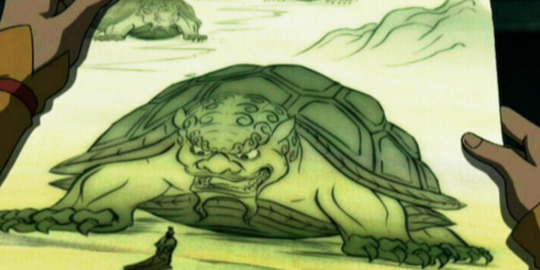
Aang: hey! Look at these weird Lion Turtle things.
Looking back now, this scene from The Library was obviously foreshadowing the finale, so the Lion Turtle reveal wasn't pulled out of thin air. It had a purpose. Considering that this episode, from Book Two, mentioned the Lion Turtle, who would later teach Aang how to energy bend and that The Guru, also from Book Two, introduced the arc of Aang having to let go of his attachment to Katara in order to master the Avatar State, I can only assume that the original intentions of the writers were very clear:
Aang doesn't want to kill Ozai but he also doesn't want to let go of Katara. That's the catch! To "energy bend" his way out of murder, he has to master the Avatar State. His conflict here, is much greater than before because now Katara is a factor in the equation as well. He either kills Ozai, keeps his attachment and gives up the Avatar State or he masters it, defeats Ozai by removing his bending but has to let go of Katara in the process. It's awesome because it's the hardest possible choice a character like Aang could be forced to make. And we knew he would ultimately do the right thing, but regardless of what he decides, he still loses something important to him, he still has to make a huge sacrifice.
Of course, none of that happens. This was the first and only time the Lion Turtle was brought up. The “letting Katara go” arc was unceremoniously killed alongside Aang the second Azula shot that lightning in Ba Sing Se, but differently from the Avatar, whom Katara ressurrected, it was never brought back. And it’s a shame. Because The Library was the perfect episode to expand on the Lion Turtle and energy bending mystery.
And the finale? It was the perfect episode for Aang to do what he failed to do in Ba Sing Se: to let Katara go and achieve the Avatar State by his own merits, sacrificing something he wanted for the greater good. The way he hid into a cocoon of rocks? It would have been a great call out to the little crystal tent he made in his fight with Azula when he decided to give the Guru’s advices a try. And it would also symbolize rebirth in the same way Katara breaking him out of the iceberg did. Because now he had finally reached the other side of the river and he is no longer the same person he once was.
But the narrative decided, instead, to rob Aang from any growth, from any substancial change, from any interesting arc. They went with the “love is the most important thing” approach to justify him honlding on to Katara. And I could have bought it if they hadn’t been so dishonest about it.
First: if you love someone, you let them go. Attachment and love are two very different things. No one ever told Aang to stop loving Katara. He was told to let her go. And it makes sense because he was attached to her in a way that wasn’t healthy for either of them, and was keeping him from achieving his full spiritual potential, something he should care a little more about, given his upbring.
Second, in the person of Iroh, arguably the wisest character in the show, Aang is told that he is right for choosing love over power. But this is a false equivalence because it’s not what Aang is doing. The scene makes it look like he is seeking power for the sake of power. That’s not the case. The Avatar State is an inherent power, meaning Aang already has it. It’s part of who he is. He just needs to unblock it and learn how to control it. And he has to do that not for personal gain, but to put an end in the war.
A war that took almost everything from Katara, the person he loves. Aside from Aang himself, she is the person who would benefit the most from him learning to control the Avatar State, since she is the one who has to calm him down every time he accidentaly triggers it and winning the war is a very personal goal of her. Now, this is just conjecture but I firmly believe that even if Katara was secretly in love with Aang (which I don’t buy), she would be the first to tell his it’s okay to let her go. But alas, she wasn’t even aware of this conflict. A conflict she played a key part in.
That being said, I do think that the Ozai dillema was introduced too late. It should have been explored before the Day of Black Sun, giving Aang plenty of time to search for a different solution. It also never made sense to me why killing Ozai wasn’t a problem then. Apparently the explanation that I was supposed to stick with is that Aang was naive. He didn’t know people expected him to kill the Fire Lord until Zuko asked him what he would do when he faced Ozai, since violence wasn’t the answer. But I honestly struggle to accept this because, yes, Aang was naive.
But not that naive. Not at that point. After episodes like The Siege of the North and The Avatar State, I just don’t buy he didn’t know what people wanted him to do. Plus, Aang has an evasive fighting style, based on always being one step ahead of his opponent. To do that, he has to plan beforehand. What was his plan to confront Ozai in the Day of Black Sun, after everything he went through? Talk to him? Arrest the guy? If that’s the case, shouldn’t it at least be discussed with the gang? It’s never addressed.
Then comes the finale. Aang’s moment of truth. The event we’ve all been hoping for. The one that will turn him into a legend. And Aang is losing. He can’t win without killing Ozai or controling the Avatar State to take his bending away. What will he sacrifice to become a hero? His morals or his attachment? Answer: neither! Because the writers decided he should have everything without give up nothing. So they miraculously make a convenently sharped rock hit the exact right spot in the perfect time unblock his chakra, allowing him to enter the Avatar State.
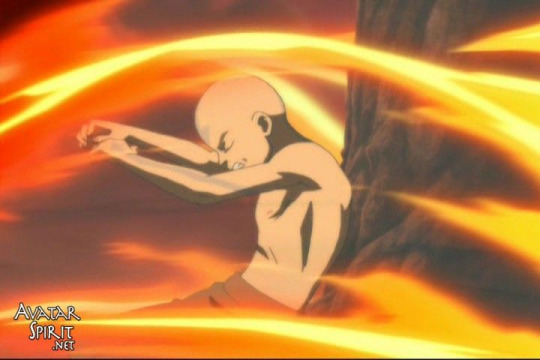
I’m not even gonna talk about how this is most definitely not how chakras work, because it’s not really my place. But I am gonna talk about the tragic (not to say hilarious) fact that, by trying to make Aang have his cake and eat it too, the writers ultimately made a fucking rock the responsible for Aang’s success. Not his cleverness, not his hard work, not his altruism: a rock. If that rock wasn’t there, in the right place, at the right time, then what? Would Aang finally have done what he had to do, or would he be killed, allowing the war to continue?
That’s my issue with it. That, and the fact that they had no trouble addressing delicate topics, but didn’t have enough courage to let the 12 years old protagonist end up alone. Because, of course, children can’t understand the hero not getting the girl. Right?
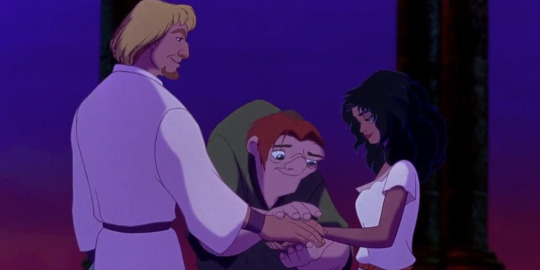
RIGHT?
Aang managed to defeat Ozai and get the girl even though there was a whole season dedicated to build up an arc in which he would have to let her go to succed. Even though their last one on one interaction before their last kiss was Aang screaming at her and storming off, while Katara reprimended him for walking away from the issue. Even if he had been acting more and more possessive and entitled when it came to her affection. Even if Katara had shown no real interest in him that way before she suddenly does. But what do I know? Maybe she was hit by a magic rock too.
Aang and Katara happened at the cost of Aang’s character development. Fandom might think the rival ship was harmed the most by it, but that’s not true. Aang was. And it’s really sad. He is an amazing character and he deserved to be the hero of his own story, to have his beliefs tested and to come out of his journey irrevocably changed, not locked inside a plot armor.
10 notes
·
View notes
Text
Psycho Analysis is a series that looks at villains across various media in the hopes of coming to something of a consensus on the overall quality of the character. Are they performed well? Do they enrich the narrative? Are their motives fleshed out? Are they voiced by Tim Curry and thus a sex icon?
There are a lot of important questions that I look into, but ultimately, Psycho Analysis boils down to asking one simple little question: How bad can a character be?
Thankfully, there’s one villain who decided to answer that question for me... in song form.
Psycho Analysis: The Once-ler
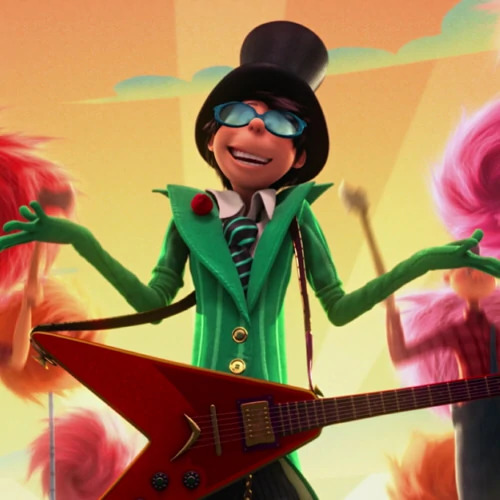
(WARNING! This analysis contains SPOILERS!)
Yeah, I’m finally talking about everyone’s favorite greedy bastard who, back in some of the darkest days of Tumblr history, ended up being the premier sexyman on the website. People were thirsting over this twiggy weirdo, acting as if he were God’s gift to women and shipping him with alternate versions of himself. Much like the movie he’s from, he is now incredibly hard to take seriously.
But hey, speaking of alternate versions of himself, I’m going to be covering him from the original book and the animated short film as well. Might as well just knock it all out of the park at once, right? Now let’s see how ba-a-a-ad this guy can be.
Motivation/Goals: The Once-ler is all about biggering. He’s making thneeds (things that everyone needs) and he is gonna stop at nothing to craft these things. Not even the power of the Lorax, Danny DeVito or otherwise, is going to stay his hand from getting that sweet, soft Truffula fluff to make his wares. This is ultimately a little unrealistic, at least for the Illumination version; if Danny DeVito asked me not to do something, I’d listen, no questions asked.
Performance: In the animated special, Bob Holt does double duty, as he is portraying both Once-ler and the title character. It works really well for what they’re going for, and the double casting is interesting because it highlights the ultimate role of the Lorax as the Once-ler’s conscience given form.
In the film, Ed Helms portrays the Once-ler, and he’s fine. He’s certainly better casting than Audrey, but that’s not particularly saying much considering that’s a non-singing Taylor Swift (when Cats is able to utilize Taylor Swift better than your musical, you know there’s trouble). I don’t know, Ed Helms is fun and all, but I’m just not sure his take on the Once-ler is all too compelling overall.
Final Fate: In the original book and the special, the Once-ler wins… but even he realizes it’s a terrible, pointless victory, and all he has achieved is ruin, his family leaving him, his business ultimately collapsing, and the environment permanently damaged. He’s left as a miserable, jaded hermit, broken by the bleak consequences his greedy actions have sown upon the world and only able to tell his story and pass on the last Truffula seed in the hopes that maybe, maybe someday the trees can regrow and the Lorax will return. The Illumination version follows this but then tacks on a happy ending where the Lorax and Once-ler reunite because as we know ambiguity and bittersweet endings cannot exist in children’s films.
Best Scene: Obviously it’s the scene where he shakes his ass to seduce Jack Frost, in one of the greatest gay romances ever put to film.
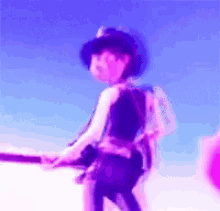
Joking aside, it is undoubtedly his villain song. It has become such a meme, but real talk? “How Bad Can I Be” slaps. This is a really good song, probably too good for the movie but you know what, I’ll take it.
youtube
Best Quote: HOW BA-A-A-AD CAN I BE? Yes, I’m using a line from his villain song. Sue me.
Final Thoughts & Score: What can one really say about the movie version of the Once-ler that hasn’t already been run into the ground? Well, how about… He’s not too bad, honestly? Like, yes, he has next to nothing to do with his book counterpart and they really go way too far into trying to make a capitalist pig sympathetic… but the animated special from the 70s did that too. I think the Once-ler honestly works better when there is a dash of complexity to him and he isn’t just a simple-minded Captain Planet villain.
Of course, the issue here is that the 70s version took a simpler approach, kind of less is more. The 70s Once-ler brings up some valid points to the Lorax about his work, and the Lorax can’t help but agree that there’s no easy answer while also stressing that the environmental devastation is still really, really bad. It works, it feels complex, and it arguably helps the ultimate point that we need to protect the environment better than even the book did (and I love the book, don’t get me wrong, but its take on the Once-ler is a bit too simple for its own good; it almost runs into the Femme Fatale problem by being a bit too much of a strawman). The movie version has a bit too much going on, especially with his family. His family are much more blatantly evil, greedy, and manipulative, but they’re relegated to the background for much of the film and don’t effect things all that much. The whole narrative would have been infinitely stronger if they were the greater scope villains behind Once-ler and were who needed to be defeated and maybe taught a lesson, but instead they are ignored in favor of someone I’ll address very shortly.
All of this leaves movie Once-ler feeling extremely disjointed, but not irredeemably so. As I said before, his villain song is unironically awesome, and as lame as it is compared to the more haunting, contemplative ending of the book and the special, I’m not so much of a curmudgeon that I didn’t at least smile when he finally reconciled with the Lorax. Ultimately though, him being memed to death really didn’t help his case, but it means I’m not giving the movie version anything less than a 3/10. He might in fact be the best “so bad it’s good” villain ever, or at least up there. He’s just so undeniably enjoyable even if the narrative isn’t making him as complex as it thinks it is. The animated special version gets a 9/10, the book version is a 7/10, and the Once-ler’s family gets a 5/10 for being an interesting concept they sadly do little with, which will now be elaborated on as I follow up on the foreshadowing from the last paragraph...
Psycho Analysis: Aloysius O’Hare
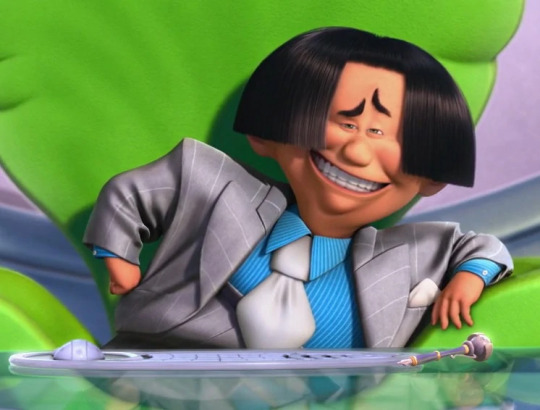
Remember how I said the Once-ler’s family gets ignored in favor of someone else? Here he is, Aloysius O’Hare, one of the absolute lamest villains ever put to screen.
Motivation/Goals: He’s greedy. That’s it. I’m not kidding. He’s just a cartoonish caricature of a rich person, which still makes him a realistic portayal but also makes him boring as sin compared to the wacky dude with a big musical number about how bad he can be.
Performance: Rob Riggle does a decent job, but there’s really not much for him to work with here. This character is a cardboard cutout who exists to be as cartoonishly greedy and evil as possible with no nuance so the kids know who to root against and so that Once-ler doesn’t look bad in comparison.
Final Fate: Look, he’s a blatantly evil corporate villain in a kid’s movie about the environment. Of course he gets defeated and everyone turns on him. What’s especially funny though is that, on the brink of learning his lesson, he rejects any form of redemption and just goes whole hog on being a villain.
Best Scene: I will absolutely give him this: in the face of his ultimate defeat, after having the virtues of trees sung to him and the entire town turning on him, he for a moment contemplates turning over a new leaf… and then absolutely rejects the thought and instead decides being evil is just too much fun, at which point he tries to get everyone back on his side by seeing a funny little song about death while wavedashing. If more shitty villains did this, I don’t think there would be shitty villains.

Best Quote: LET IT DIE, LET IT DIE, LET IT SHRIVEL UP AND DIE! Yes I’m quoting a song again.
Final Thoughts & Score: Look, I’m not gonna mine words here: O’Hare sucks. Big time. He is a prime example of why The Lorax failed as an adaptation. In a story that is dealing with a moral grayness with no easy answers, O’Hare is just a big, blatant target, a dark shade of black in terms of black-and-white morality. He’s like a reject Captain Planet villain with Edna Mode’s haircut.
The movie would have been infinitely better if, instead of him, the Once-ler’s family were in control of the town, and they needed to learn the lesson about saving the trees instead of simply vanishing from the story. They were shown to be overbearing, manipulative, and greedy, and they had a much more personal connection with Once-ler being, you know, his actual family. The fact they abandon him and never really get any sort of comeuppance despite being perhaps the most evil people in the move, egging on Once-ler and taking full advantage of him, makes O’Hare all the more egregious, because there could have been some strong thematic elements that would have tied the film together and made it come off as much less preachy and more nuanced.
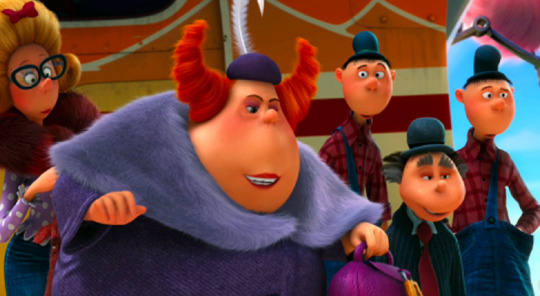
But we don’t live in a world where that happened, we live in a world where we got O’Hare. Aside from some genuine hilarity from him at the end, O’Hare really adds very little to the film. I gotta give him a 2/10, but I will say he’s a lot closer to a 3 than he is to a 1; there’s no denying his absolute rejection of learning a moral is absolutely hilarious. I love when villains do that. It’s just a shame those funny moments are wrapped up in something monumentally unimpressive.
37 notes
·
View notes
Note
We all know that the Gothel twist was terrible and was only there for the sake of having a twist, but if it absolutely have been done, how should it had happened to make it better narratively?
so. i spent a lot of time kind of mulling over and autopsying s3 and my personal conclusion about what went wrong is that tts hamstrung itself with poor narrative structure. and this is going to be one of those posts where i lead with definitions of the terminology i’m going to use, for the sake of clarity and to avoid any misunderstanding.
to whit:
story is the sum total of every element of a narrative: character, plot, setting, theme, and structure.
character is, of course, the people in the story. it’s “who?”
plot is the events that happen in a story. it’s “what?”
setting is the time and place of the story. it’s “where?” and “when?”
theme is what the story is *about.* it’s “why?”
and then there’s narrative structure, which i think is a little harder to grasp because it’s much more invisible than the other things. but it’s the framework of the story, or the scaffolding. it’s “how?” — how are the characters rendered? how is the setting created? how are the events of the plot strung together along the throughline? how is the story built?
now… in my opinion, character is the single most important element of a story; compelling characters can salvage an otherwise mediocre story, and nothing kills a story faster than uninteresting characters.
but the one thing good characters can’t ultimately compensate for is poor structure. if the construction is shoddy, so to speak, sooner or later, the roof is gonna leak. right? and we can see this happen in tts: s1 and s2 are solid, and then bam! we hit s3 and it’s a mess of bizarre pacing and dropped characters, the feelings and motivations of key players get all wonky, the plot loses focus, and things increasingly feel like they’re happening by authorial fiat. the weak structure of the narrative has failed, and it dragged the entire story down with it.
and we can look back in retrospect and see that, yeah, all of these problems existed before; tts always had odd pacing, always had an issue with maintenance of the supporting cast, always relied more on convenience than a narrative really should. but these things didn’t hit a critical mass until s3.
so what does this have to do with gothel? well,
in and of itself, “gothel is cassandra’s mother!” is not a terrible plot twist. the problem with it is a problem of execution, which is to say, the flaw is in the structure, not the plot.
#1: set-up
plot twists are kind of difficult to pull off well, because you don’t want to blindside people, but you also don’t want to tip your hand too soon. you want to surprise, or maybe even shock—but you don’t want your audience to go, “wait, WHAT? that makes no sense!”
do you remember the whole “ricky’s quest” thing that went on in s2? we were told that there was an important piece of foreshadowing somewhere in s1 or s2 that no one had picked up on yet and there was this whole thing of people trying to figure out what it was, and then… rapunzel’s return aired, and ricky revealed that the answer was “cassandra briefly glances into the shattered mirror in rapunzel’s tower.”
and that, + the fact that we know cass is adopted and doesn’t remember her birth parents, + vague visual similarities, is the entirety of the s1-s2 foreshadowing for cassandra being gothel’s daughter.
which isn’t nothing, i’ll grant you, but for something as major as the gothel twist, for something that profoundly changes the worldview and motivations of one of the main characters to such a degree that she completely changes sides because of it, it might as well be nothing.
gothel is afforded zero narrative importance in s1-s2. rapunzel has one nightmare about her, and some lingering trauma connected to the tower that is explored, and of course tromus briefly uses her image to try to control rapunzel in rapunzeltopia. but gothel herself is a non-entity until she abruptly and without warning becomes the emotional lynchpin of the entire conflict in s3. that’s jarring.
cassandra is a complex character whose apparent motivations for turning against rapunzel are meticulously built up over the course of s2… only for s3 to pull a bait-and-switch, sweep all of that set-up under the rug, and replace it with cassandra’s messed up feelings about gothel’s abandonment. even her ruined hand never gets mentioned again—not by her, not by zhan tiri, not by rapunzel, not by anyone. that’s jarring, too.
to use my own work as a point of comparison here, the bitter snow equivalent of the gothel reveal is cassandra finding out that sirin is her aunt and her parents were innocent. like the gothel twist, learning that information profoundly changes how cassandra sees herself and the world, and it’s intended to be a big shock… but unlike the gothel twist, i did a lot of setting up for it:
1: sirin has real narrative importance in the first half of the story, pre-reveal. the fic opens with her, her involvement with the separatists is established early, etc.
2: pieces of cassandra’s backstory are threaded through the first half of the story. by the time we hit the reveal, it’s been established that cass is saporian, that her parents were executed for treason, that this treason involved selling poisoned crops and causing outbreaks of a deadly sickness.
3: there are many demonstrations of anti-saporian discrimination and prejudice in the first half of the story: the way cass sees herself and the alienation she feels from the rest of corona, past incidents where she was targeted for being saporian, basically every time gilbert opens his mouth, what happened to caine’s dad.
4: cassandra discovers evidence of the harsh, unjust nature of the crackdown and realizes that at least some of what she’s been taught about coronan law enforcement and recent history is inaccurate… thus planting the seed, for the readers if not for cass herself, that other things might be false too.
5: caine points out that cass is the reason the separatists don’t let parents join up, and though she doesn’t elaborate on that, it’s because cass is proof that corona will steal saporian children if their parents are accused of treason.
and 6: everything sirin says to cass in chapter 14 is wrapped up in her being painfully, painfully aware that a) cass is her niece and b) probably doesn’t know the whole story—while also trying to stick to the plan. so… while she doesn’t spill the beans there, she knows who cass is, she stops andrew from hurting her, she makes a point of not acknowledging the legitimacy of cassandra’s adoption, and obliquely suggests that sir peter is a murderer… and while she tries to stop cass from interfering with what they’re doing, she doesn’t hurt her, even though she very much could.
so… in chapter 15, when sirin comes out with “actually, the blight was a natural disaster no one anticipated and saporians got sick and died too, your parents were just scapegoats because corona wanted someone to blame, and oh, by the way, you’re my niece,” it’s a shock but not one that comes entirely out of left field. cassandra’s parents being innocent victims of an overzealous and prejudiced justice system is a logical extension of all the stuff that has already been set up, and sirin being cass’s aunt helps to clarify motivations that were previously opaque (such as: why does sirin despise corona so much, why didn’t she just kill cass, etc).
and because all of this stuff is given so much attention in the first half of the story, the way it snaps cassandra’s worldview in half and causes such a massive reorienting of her goals and loyalties feels natural. because it already mattered a great deal to her, and it related to the doubts she was already experiencing.
which like, that’s the key. setting up a big plot twist isn’t about establishing one basic fact (“cass is adopted”) and tossing in one instance of symbolic foreshadowing (the mirror thing) and nothing else, over the course of two whole seasons of a tv show. it is about priming the audience to be ready to accept the reveal.
how could tts have done this with the gothel reveal? here’s some ideas:
1: give gothel a greater presence in the narrative. the simplest way to do this would be to really lean in to how fucked up rapunzel is because of her. more nightmares, more overt moments where we see rapunzel still being haunted by her memory. alternatively, lean more into the fact that gothel was a disciple of zhan tiri.
2: give cassandra’s adoption, and the question of her birth parents, even a teeny tiny glimmer of interest. specifically, let “dad found me after my parents abandoned me” be the only thing cass knows about her adoption, and let that hurt her. she doesn’t even have to be curious about who her birth parents were—just have that pain of abandonment more present in the first two seasons.
3: imply the captain knows more about cassandra’s origins than he lets on.
4: you know the parallel in RATGT where rapunzel screams at cass the way gothel screamed at rapunzel? more of that. like, how delicious would it be if there were many little instances in s1-s2 of rapunzel lashing out at cass with behaviors she obviously subconsciously learned from gothel, only for s3 to pull the sucker punch of cassandra being gothel’s daughter? like! imagine how that could so EASILY make cassandra recontextualize her entire relationship with rapunzel by linking rapunzel’s toxic behaviors with gothel’s abuse and abandonment in her mind? and then in s3 you can really dig into rapunzel interrogating her own behaviors and struggling to break the cycle of abuse.
5: if gothel being a former disciple of zhan tiri is narratively important, it can go hand-in-hand with zhan tiri and the other disciples more overtly targeting cass, specifically. even if we don’t know why until the reveal.
i’ve seen a couple posts from other folks discussing how to “fix” the gothel twist, and many of them involve cass either knowing from the start or finding out much earlier, but while that could work, i don’t think it’s necessary. it’s all about the set up. it’s all about constructing the story in such a way that the audience goes “OH!” instead of “WHAT?!” when the reveal happens, and the specific timing of the reveal doesn’t really… matter.
#2: execution
surprising absolutely no one, i’m going to talk about zhan tiri now.
based on what chris has said in various interviews, my understanding is this: originally, cass was originally supposed to be a secret antagonist all along and know about her parentage right out of the gate. her characterization softened early on in the process, her knowing about gothel got dropped, and suddenly the creators needed a way for her to learn that gothel was her mom, and thus zhan tiri entered the narrative.
she is a plot device whose whole purpose is to tell cass “gothel was your mom and abandoned you for rapunzel,” and then fuel her downward spiral. the rest of her character exists in service of that, full stop.
which… like the gothel reveal, having a character whose primary function is to be a plot device isn’t a problem in and of itself. however. “ancient evil demonic sorceress with deep ties to the magical lore of the setting and an entrenched hatred for team hero, whose MO is manipulating people” is a terrible character archetype to use as this kind of plot device, because that kind of character needs to have an agenda in order to function, and as soon as you give them an agenda they develop a gravitational pull on the rest of the story, especially if they’re directly involved with a main character.
and if you’re willing to roll with that gravitational pull, it can be fine. but if you’re not… you get tts s3.
chris has pretty much spelled this out in interviews. he said at one point that they debated multiple potential motives for zhan tiri… but found that anything more complex than “wants the drops and to burn corona to the ground, because reasons” sucked oxygen away from the cass vs raps conflict and eventual reconciliation, which… yeah. so they gave zhan tiri the cardboard motives and didn’t really do anything with her other than trotting her out to give cass a good shove in whatever direction the plot needed cass to fall in every so often.
that zhan tiri is a compelling character in s3 at all is a testament to the strength of her VA and the sheer potential of her established lore, in combination with the fact that she and cassandra are off screen enough to demand that the audience fill in a lot of gaps. but in, like, the actual text, she has all the complex personality of a piece of damp tissue paper and she is, for all intents and purposes, literally just Cassandra’s Brain. every decision, every single decision cass makes in s3 is because of zhan tiri. why take the moonstone? zhan tiri tells her to. why is she so mad at rapunzel? zhan tiri made her that way. why does she attack rapunzel? zhan tiri convinced her she had to. why does she go to gothel’s cabin in TOTS? zhan tiri tipped her off that rapunzel would be there. why does her fragile truce with rapunzel fall apart at the end of TOTS? zhan tiri interfered. why does she try to reconcile again in OAH? she found out zhan tiri was… zhan tiri. why does that reconciliation fail? zhan tiri. why does cass ultimately redeem herself? because zhan tiri stabs her in the back first.
*deep breath*
this is what happens when you troubleshoot a broken narrative with plot devices instead of opening it up to fix whatever is wrong with the underlying structure. in this case, cassandra not knowing about gothel from the get go broke her planned villain arc… and the creators applied zhan tiri like a bandaid, molding this new character into someone who could railroad cass down the preexisting plan for her villain arc.
what needed to happen instead was a wholesale reexamination and reconfiguration of cassandra’s villain arc, her reasons for going down that path, and her reasons for coming back. even if finding out the truth about gothel was still the trigger for it, it’s ultimately not about gothel anymore. gothel is just the last straw.
and in order to work with the characters as-established in s1-s2, the events of s3 would need to be framed that way. if, after all the shit she goes through in s2, cass met zhan tiri, learned that gothel was her mom and abandoned her for rapunzel, and finally just snapped and went after the moonstone because fuck this, fuck you, and then zhan tiri came in with the compassion and emotional validation and the “your mother treated you as a servant and then discarded you for something she thought was better, and so did rapunzel, didn’t she? but i see you, i believe in you, i am your friend, and we can help each other,” and cass bought that because she’s desperate for emotional support and kindness and fuck it, she’s on team demon now, only for her conscience to eat away at her until she couldn’t take it anymore and broke away from zhan tiri for good… then it works, full stop.
like, you don’t have to change a single plot event for the gothel twist to work. you just have to string those plot events along an emotional throughline that makes sense and feels connected to what happened in s1-s2. you can’t use zhan tiri to graft the s3 arc of evil-all-along proto-cass onto canon s1-s2 and call it a day because that doesn’t work! you have to write for the characters you have, not their early planning-stages iterations. if you make a decision early on that breaks your original plan, you have to commit to redoing the whole plan.
and if you do that, if you fix the underlying structure, you don’t need a character whose sole purpose is to railroad another character down a predetermined path that no longer fits her characterization; cass and zhan tiri can instead both be characters, acting according to their motivations and goals, and not puppets pantomiming the ghost of a broken plan.
(you do still have to accept that zhan tiri will pull focus away from the cass+rapunzel friendship, though. them’s the breaks. don’t use zhan tiris if you’re not willing to let them gobble up the spotlight a bit.)
TL;DR: to fix the gothel twist, set it up better in s1-s2 by making the question of cassandra’s parentage, or abandonment by her parentage, important to the narrative at all, or else by focusing more closely on gothel being a disciple of zhan tiri; then execute the s3 villain arc in a way that makes sense for canon cass and what she experiences in s1-s2, rather than using zhan tiri to railroad her down the path evil-all-along proto-cass was supposed to take.
the problem is a structural one so at the end of the day the solution is to fix the structure. ¯\_(ツ)_/¯
111 notes
·
View notes
Text
I sometimes feel like being in fandoms makes people see things in black and white. Everything becomes an “either/or” situation. You are either for something or against something, pro a storytelling aspect or character or anti a storytelling aspect or character. The nature of fandom tags on tumblr kind of cultivates this attitude. In order to categorize your thoughts on your blog, you need simple phrases that help with easy categorization, so that’s why we get things like “pro-this movie” or “anti-this movie” or “pro-this character” or “anti-this character.” But the simplistic quality of such categorizations kills nuanced analysis - or makes it more difficult to enunciate one’s thoughts when they fall into a grey zone.
I’ve written a fair number of analyses of Frozen on this blog and they’ve been met with a lovely and positive reception. But because, as I’ve said in the past, I have mixed feelings about F2, I always worry about how other people will read my posts. Will they think I am being too negative about the film and then question me when I profess to like it? Will they feel I’m being too positive and call into question my critiques? Depending on their perspectives, how will other people try to categorize me?
It’s not merely anxiety on my part - although anxiety makes it worse. In the past, sometimes my words have been misconstrued by others or, in other cases, I’ve not explained myself clearly enough and so they’ve been taken for something outside my intent. This has exacerbated my anxiety at times because I feel I walk a fine line where I both agree and disagree with all sides in the fandom to a certain degree. But that nebulousness defies easy categorization, so I always worry people will look and my posts and think things like...
Oh, you feel F2 didn’t reflect enough on how Agnarr and Iduna’s actions hurt their daughters? Does that mean you’re anti Agnarr and Iduna? No. I love Agnarr and Iduna dearly. I think they are incredibly rich and compelling characters. I also think that the backstory F2 gives them only makes them more interesting characters, giving them layers that go beyond the layers they already had from their limited presence in the first film. I also think that Agnarr and Iduna are good people and that they loved their daughters dearly, that they were caught in a terrible position and did everything to protect their daughters. And I further think that, given the time to come to terms with their parents’ actions, it’s perfectly valid for Elsa and Anna to still love them. As I said before, they are good people with their own fears for the future, wanting to protect their children. But I also feel that, by ignoring Agnarr’s and Iduna’s role in the sisters’ separation as children (and actually, by avoiding discussion the childhood events altogether), F2 never allows Elsa and Anna to come to terms with their parents’ actions. It never acknowledges their parents’ part in the hurt the sisters experienced as children (and, of course, it never acknowledges the trolls’ part in it either, even though the trolls were acting as guides for the king and queen and all their choices impacted the lives of these two children negatively.) It never acknowledges that people can love you - and still hurt you. And it never gives the sisters’ closure for that even though the narrative of F2 is all about their parents and (Elsa, at least) finding some form of closure with Iduna. But, in spite of my issues with the narrative, I like Agnarr and Iduna as characters - ESPECIALLY Iduna, whose backstory in F2 makes her fascinating.
Oh, you feel Elsa’s arc in F2 could have been written better? Does that mean you’re anti-Elsa/”Elsa-critical?” No. When I say that Elsa’s arc could have been written better, I am criticizing the structural elements that make up her arc, not criticizing Elsa herself. In fact, it’s my love for the character of Elsa that inspires my meditation on her arc. I’ve loved and deeply related to Elsa since the first film. Even when people got to rolling their eyes at the oversaturation of Let it Go, I’ve always kept the song close to my heart because it means something to me. I actually don’t particularly care for the tag “Elsa critical” because I think people using that tag are sometimes too quick to condemn Elsa for things when they should be condemning pacing issues in F2 or writing issues that made the writers’ intent unclear or moments that feel slightly OOC for Elsa compared to the first film.
And keep in mind, when I say “moments that feel slightly OOC for Elsa,” I’m not saying that Elsa feels “completely OOC” the way some people do or trying to dismiss what the writers were trying to do for her character. There are actually elements in F2 with Elsa that I feel are great character elements and they should not be disregarded - but there is also a dubious focus on her connection to the abstract concept of magic instead of her connection to other people. This undercuts some of the strong character moments that do exist in the film.
And again, keep in mind, when I say, “a focus on the abstract concept of magic rather than her connection with other people,” I’m not saying that Elsa loses her humanity in F2. She doesn’t. There are still moments that show her humanity and her human connections with other people. What I’m saying is that those human elements take a backseat to her connection to Ahtohallan, which does a disservice to her arc and its emotional impact, in my opinion.
Oh, you feel that aspects of the ending of F2 feel unearned to a certain degree? That sounds like you dislike F2. Didn’t you say you liked F2? Which is it? Are you just trying to confuse people? No, I’m not trying to confuse people. It’s just that you can like certain aspects of a film and dislike others, feel parts of a film were well-done and other parts less so. My feelings on F2 are... complicated. I love Anna as queen of Arendelle, I think she makes an amazing queen. A part of me wants Elsa to stay in Arendelle because I like the idea of the sisters being physically together and I feel the films and shorts have built a better connection between Elsa and the people of Arendelle than Elsa and the Forest. BUT, at the same time, I deeply love the Northuldra and want to see both Elsa and Anna bond with their mother’s people more and I love the idea of Elsa living with the Northuldra and connecting with them. My issue is the film doesn’t emphasize building Elsa’s connection with the Northuldra when that is the most emotionally resonant human element that connects her to the Forest. I actually want to see more of the Northuldra in F2′s narrative to give the ending greater depth.
(Also, I think it’s a shame that the film kind of brushes aside Anna’s connection to the Northuldra and her making bonds with her mother’s people. I know the film wants to set up Anna’s connection to Arendelle to foreshadow her taking the queenship but... both is good, as I’ve said in other posts.)
And I guess that’s what separates me from other people who dislike the ending. Yes, I’ve said that I prefer the sisters being physically together, but I’m not against F2′s ending on principle the way some people are. F2′s ending could work perfectly with a few rewrites to the narrative. I like it in concept, but not execution. I love Anna’s arc and Elsa’s arc has beautiful elements, conceptually at least. I love the idea of her being able to broaden her horizons and meet new people. The trouble is, the film doesn’t emphasize her bonding with those new people and writes them out of the narrative for no good reason for the second half of the film. And because I feel that Elsa’s connections with other human beings are what help me relate to her, more than the abstract concept of her individuality and abstract connections to magic and the spirits, that makes the ending of the film ring a little hollow for me. Especially when the sense of emotional connection I feel to the sisters reconnecting in Frozen Fever is so much stronger to me on a personal level than F2. (That last sentence I mentioned is personal feeling, but I hope that otherwise, I have supported my perspective with references to the text that readers feel are valid.)
Again, I’m not trying to take anything away from people who love Elsa’s arc and the film in general. There are many things I love about it. myself I recognize the beauty they see in it and I value that beauty.
I apologize. Maybe this is just rambling born of my anxiety - or reiteration of points I’ve made before. But I hope, if you read this, you feel I discuss these things with clarity, respect, and fairness for different perspectives. Thank you.
19 notes
·
View notes
Text
Tangled Salt Marathon - Max and Eugene in Peril on the High Seas
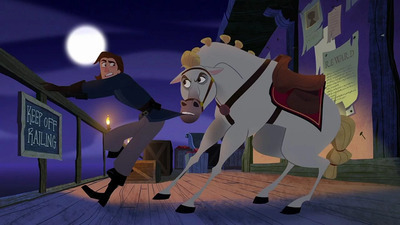
So we have another obligatory animal focused episode. This one fairs much better than Max’s Enemy and King Pascal; but it’s still ultimately useless filler.
Summary: Rapunzel and the group are finally leaving Tirapai Island when the cargo ferry arrives, but Eugene and Maximus get into an argument, resulting in them falling overboard. They manage to save themselves on a passing ship, but discover it to be a prison ship where all the criminals, including the Stabbington Brothers, Lady Caine and Axel have escaped and taken control. Eugene and Maximus attempt to escape, but discover the villains' plot to ambush the cargo ferry and set out to stop them. Meanwhile, Rapunzel and the group discover Eugene and Maximus are missing and set out to rescue them.
There’s No Ticking Clock In Season Two and That’s to the Series’s Detriment
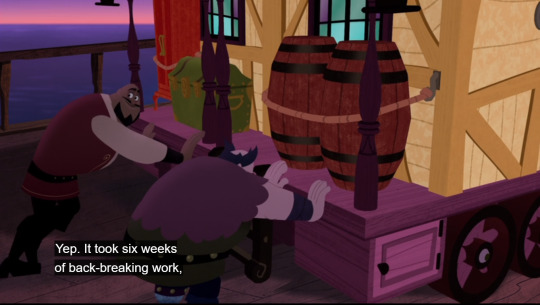
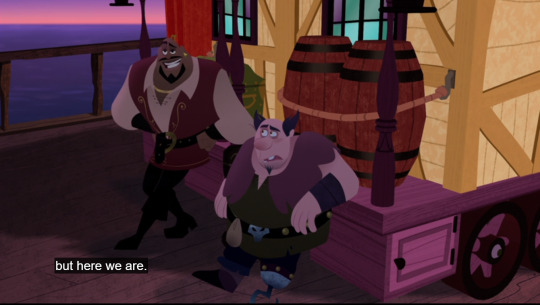
So we’re finally leaving the island and this bit of dialogue tells us that they were on said island for at least six weeks. Which matters not in the slightest in the grand scheme of things; which is the problem.
In addition to there being no outside threat forcing Rapunzel on this journey, there’s also nothing that’s forcing her to hurry up. So we’re doubly lacking in tension. There are no stakes in season two so things feel over long, and arcs that have the heroes stay in one place for more than two episodes at time stop the momentum of the series dead; leading to tedium for the viewers.
We Didn’t Need King Pascal Just to Set Up the Firefly
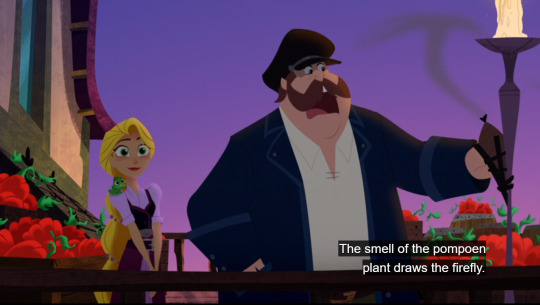
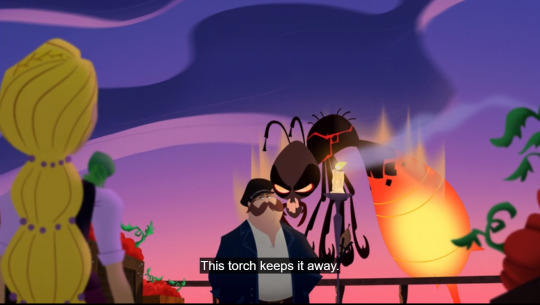
The firefly is one of the few elements in the show that has proper set up and resolve. It’s established as the threat in one episode and then used as the solution in this episode. However both episodes are utterly useless in the over all arc so, while clever, it’s a wasted idea. It’s also unneeded since this intro exposition re-explains what the firefly is and what it’s deal is in case people missed out on King Pascal anyways.
The Reason Why this Max Focus Episode Works, but Not Max’s Enemy, is Because It’s a Double Act
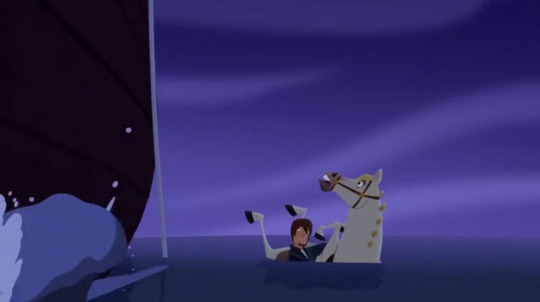
The problem with the mandated animal themed episodes every season is that Max and Pascal aren’t strong enough characters to work by themselves. They’re sidekicks; they’re designed to play off other characters. The writers seemed to clue in on this by making this episode and Max’s episode in season three, team up episodes. So now today’s episode becomes a Eugene focused episode too. Which in turn allows for their character dynamic to be fleshed out more.
We needed more interesting combinations of the mains in episodes like this one in order for the group to feel like a group. We also desperately needed to do something similar for Pascal instead of just rehashing the same plot for him over and over again.
This Plot Point Makes No Sense
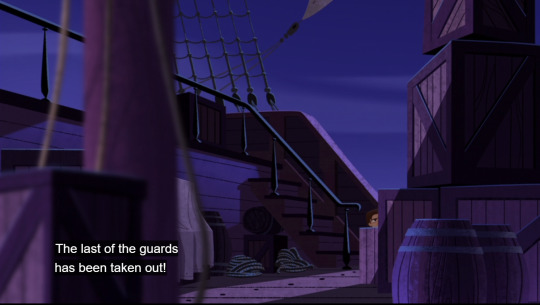
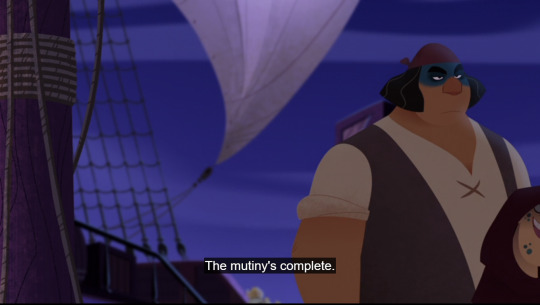
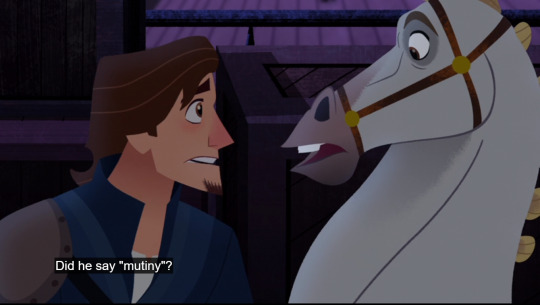
When I first saw this episode, I thought it was foreshadowing later developments for season three, seeing how it’s one of the few episodes in season two that connects back to season one. However, once you know the events of season three, this episode no longer makes logical sense within the greater narrative.
For you see, Andrew and Varian have teamed up to take over Corona at the beginning of season three. Yet that begs the question of why didn’t Frederic ship them away on the prison barge as well. Varian you might could excuse being missing here given his age, but Andrew? There’s no reason to keep Andrew around; none that is given on screen anyways.
Also this mutiny couldn’t have taken place after the Saporian take over either. For starters all the guards retreated from Corona entirely when it became evident that the Saporians were in charge. That’s a stated plot point in Rapunzel’s Return to explain why Cap is missing. There wouldn’t have been a need for a mutiny if Andrew just let all the criminals go and there’d be no reason why Andrew would send them away using his own guards. The Saporians are small in numbers and that would be a waste of manpower.
Also, because the Saporians are outnumbered, it doesn’t make sense to send away potential allies. Lady Caine has more logical motivation to join Andrew in his take over than Varian does. She just wants revenge on Frederic and riches. She cares nothing about ruling a kingdom and holds no qualms about hurting others; so she’d be the perfect partner for Andrew’s plans. Add in the fact that she has a whole gang/small army of criminals under her command, and she could have brought along some much needed manpower.
Lady Caine is Wasted!!!
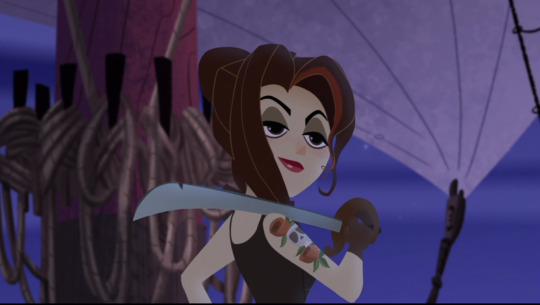
Speaking of Lady Caine, this is her final appearance in the show. Introduced in the pilot as an important character, yet given only three episodes and shoved out of the picture before the final season. And they didn’t even bother to bring up her original motivations or goals in any of her return appearances.
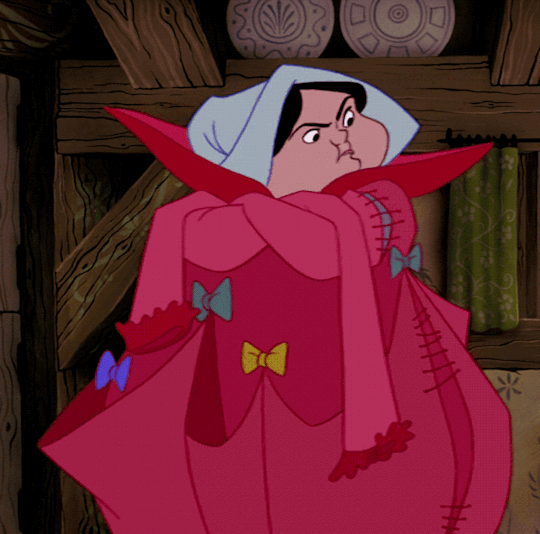
Chris mentioned in interviews about how he wanted to ‘defy audience perception’ and so pulled a bunch of bait and switches in the writing; but this isn’t that. This is just straight up lazy writing. There’s nothing clever about introducing a character as being important and then not using them. It’s a frustrating waste of time and a waste of a concept; not a surprising ‘gotcha’ for the audience.
Proper set up and resolve exists in storytelling in order to get your audience invested in what is happening and then give them a satisfying pay out for their continued involvement. Modern television writers have gotten so caught up in ‘shocking’ twists that they forgot the importance of giving satisfying endings to their audience. Because if the audience isn’t satisfied they will walk away. Hooks alone are not enough to keep them around as evidenced by the series ratings drop.
Also, Why is Weasel Here?
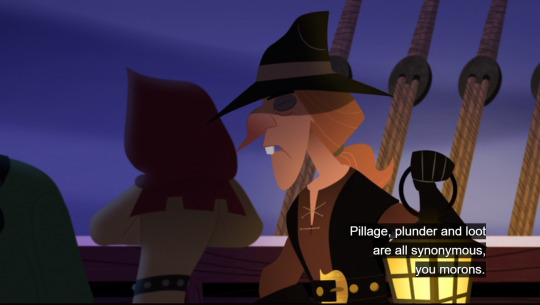
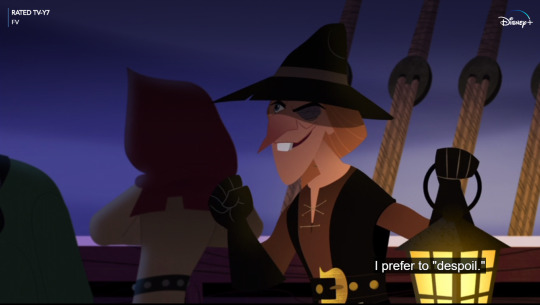
I once suggested that this episode would make more sense if Max’s Enemy came before One Angry Princess in season one. Implying that Caine and the gang were sent away before Andrew’s arrest. This idea flies out the window with Anthony the Weasel here. He was last seen running away at the end of The Return of Quaid. How the hell did he wind up here?
He had to have been arrested, put on trial, and then shipped away with the other criminals in between TRoQ and PotHS. Which just raises a whole bunch of other questions.
How much time has passed between then and now?
What did Weasel do to get caught in Corona?
Why did it take so long to ship Caine and her gang out when it was just a matter of days for Attila to be banished?
Why wasn’t she put on that same barge Attila was going to be put on?
If there was enough time to ship Attila and the Weasel out then there was plenty of time to ship Andrew and Varian, so why are they still in Corona?
Why is there even a prison barge to begin with? Are they just that stripped for room and man power in Corona’s dungeons?
Where does the prison barge actually go to? Does Corona own a prison island or do they have a deal with another kingdom? What is the world building behind this plot point?
Also where the heck did Dwayne go?
You Need Villains
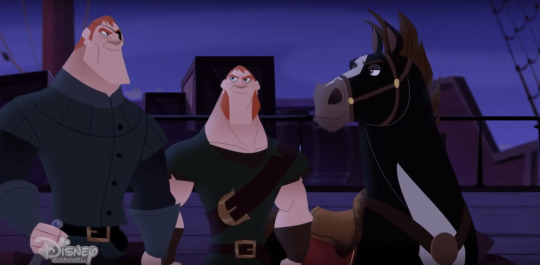
In the end it doesn’t matter. This is just a lame excuse to get rid of all of the season one villians besides the Stabbingtons. Which only stick around because they’re movie originals and need to reappear and be redeemed before the wedding short; otherwise they’d be gone too.
Which is the dumbest idea ever! Season two and even the first half of season three is devoid of any main antagonists so why are we getting rid of anyone who could potentially fulfill that role? Who’s stupid idea was this? What were they smoking? This goes against basic writing 101. There’s no story if there’s no conflict!
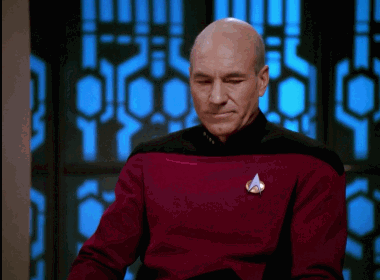
Eugene Has a Point
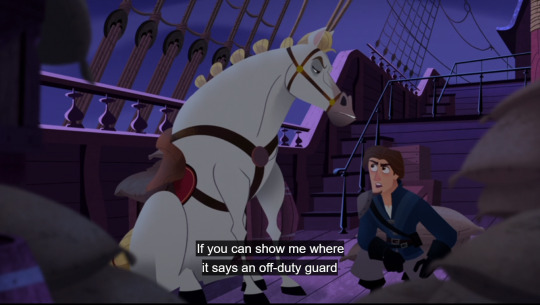
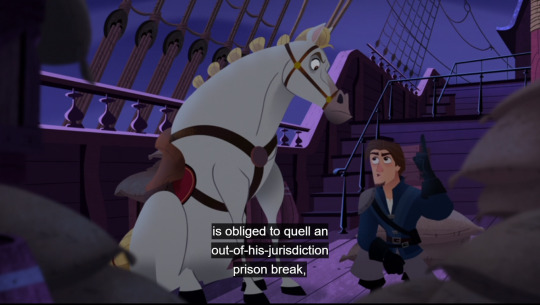
Like there are reasons why law enforcement aren’t on call 24/7 and there are also reasons why different territories have different jurisdictions. Not complying to that undermines law and order, not upholds it.
If a police officer from the US could arrest people while on vacation in Spain, it’d be a political nightmare. Even extrication of wanted criminals who seek refuge in other countries requires permission and cooperation from those countries governments or you’d be violating international law; which potentially could be seen as an act of war.
Also you would still send in people who are actually on duty. Right now there are protests in my country regarding the lack of accountability police officers have. Plenty of cops break the law both on and off duty because they know they can get away with because of the nepotism within the force. Max pulling out a guide book that essentially gives Corona’s guards permission to ‘enact justice as they see fit’ while even off duty is clear case of an abuse of power, and futhers the narrative that Corona is a dictatorship/police state that persecutes it’s most vulnerable citizens.
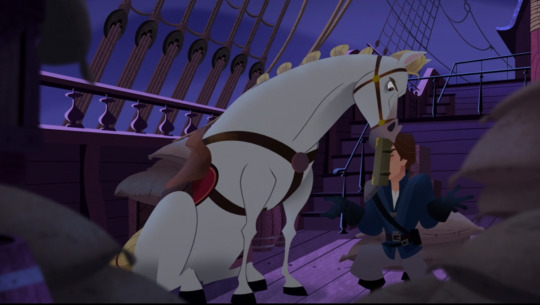
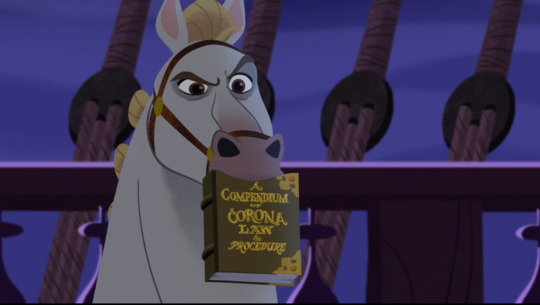
The fact that the narrative then rewards this line of thought by placing Max in the right on this is just another check off in the long list of promoting authoritarian beliefs that this series teaches. People with power are held to different standards then those without. That’s just a fact of life. Having Eugene or Max acknowledge that this does break the law but is still right thing to do would be far better message and give the characters more complexity.
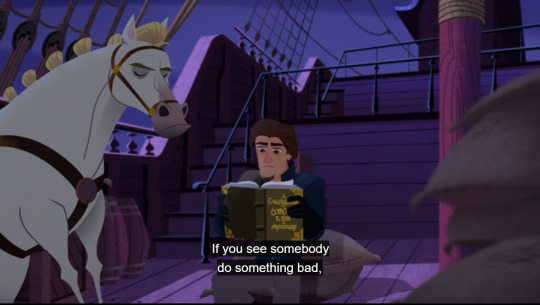
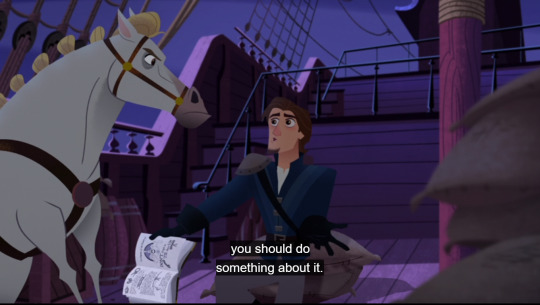
Who gets to decide what is ‘bad’ here? What is this ‘something’ they are meant to do? This rule is a gateway for corruption because it’s not clearly defined and relies too heavily on the idea that guards are naturally ‘honorable’ and good and not, you know, people.
There’s a saying in law school. Nothing is simple and fair. If it’s simple then it’s not fair; and if it's fair then its not simple.
Laws are complex because life is complex, people are complex, and not everything applies the same way because situations are different. That’s why we have courts. And yes, sometimes there’s too much discrepancy in sentences, leading to some people being harshly over punished while others get away with little more than a slap on the hand; but having things the other way around would still cause such discrepancy as not everyone’s experiences are equal to begin with.
And before you say I’m reading too much into a kids show, this is a conflict that the episode itself has decided to introduce. If you wanted a simple message about doing the right thing than ‘the law’ should not have been brought up at all. Because laws are not simple, they are not universal, and they are not infallible. If the writers thought this idea too complex for their audience then they shouldn’t have introduced the idea.
It's better to not bring up deeper subject matter at all than to introduce it and then not address it properly.
Oh, and We Get Confirmation that Corona Speaks English, for Some Reason...
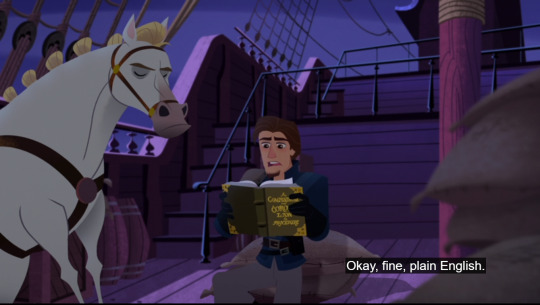
This was also hinted at this in the supplement book, My First Year As A Princess; which was suppose to replica of Rapunzel’s Diary in the show, though it’s sverealy been paired down from the original concept.
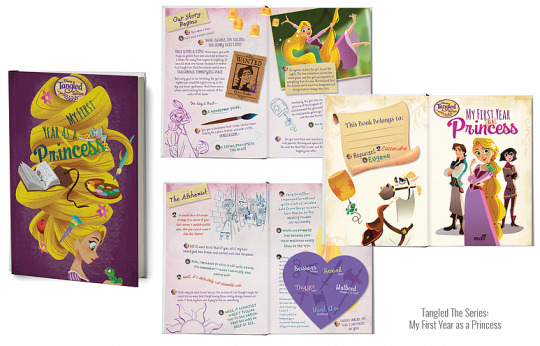
Anyways, it’s pretty much canon that everyone is indeed speaking English on screen, even though there’s no logical reason for this. Chalk it up to yet more lazy world building.
Corona is never hinted to being a replacement for England itself. The few hints we get to it’s placement on the world map suggests it’s on the main continent of Europe and is a peninsula. Other real world languages like, French, Italian, and German are confirmed to exist, with Italy at least being a real location in this world.
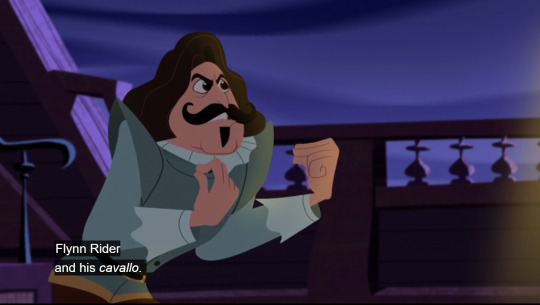
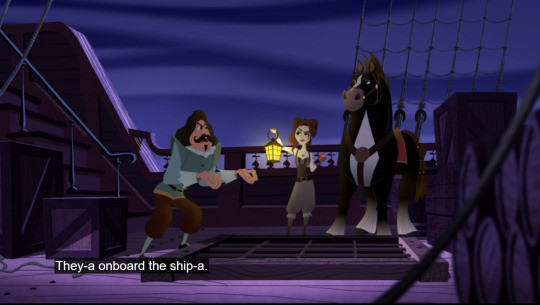
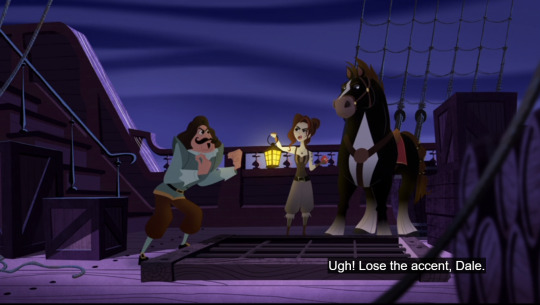
Also we spend this whole season traveling to other kingdoms. So why would everyone speak English? This is before British and American imperialism, and before the internet, so English wouldn’t be a default secondary language for the many countries that it is today. So how does this work?
Once again, if traveling the world is a big plot point of your story then you need to determinate where and how your main protagonist fits into that world. If they’re a princess of a kingdom then we need to know where that kingdom is in relation to the surrounding places we visit or discuss.
Axel is Still Useless
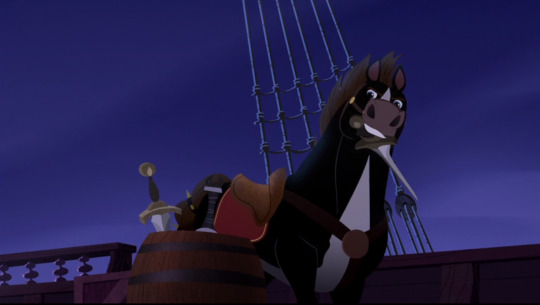
Max didn’t need a rival. This character adds nothing to the over all story and is one villain/character too many in an already overstuffed series. I don’t mind the idea of pairing down some of the minions and other background characters. I just take issue with getting rid of all of the villains. Particularly interesting ones that could have done more, like Weasel or Lady Caine.
The Very Existence of Lady Caine Undermines Both Rapunzel’s and Cassandra’s Arcs
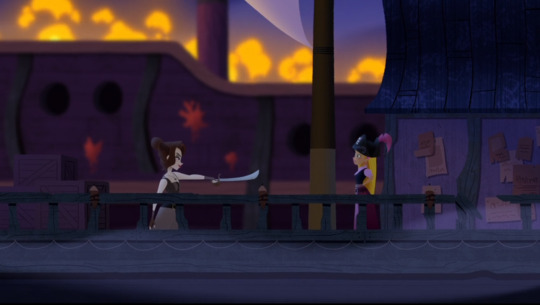
So the series wants to present this idea that Rapunzel is compassionate and is all about giving second chances, yet Caine, one of the most sympathetic villains in the show next to Varian, is given zero chance at all. The show is too busy trying to make Rapunzel look ‘bad ass’ by easily taking down an seemingly equal badass female villain, that doesn’t stop to think about the implications of this conflict.
The series fails because the only people Rapunzel redeems are people that she needs something from. She needs Styalan to gain the Eye of Pincosta. She needs Varian to help defeat the Saporians and ease her bruised ego. She needs Cassandra because she’s her best friend and it hurts her personally for them to no longer be friends. None of the redemptions in the show are actually about the characters who are redeeming themselves, it’s about their effect on Rapunzel’s personal life.
But placing Rapunzel’s personal feelings above what other characters actually need is the opposite of compassion. It’s selfishness. It doesn’t make Rapunzel the focus of the story it just makes her look like an ass.
Moreover Lady Caine’s arc is directly tied to Corona’s corrupt legal system. Rapunzel can’t be this purveyor of change if she and the show never acknowledges why the system must change to begin with.
Last off, Cassandra’s arc is then diminished by the existence of more sympathetic villains like Caine and Varian. They have more reason to do the things they do, and their actions connect back to their goals. Cass doing worst things for less reason, and then getting away with less punishment than them, is a slap in the face to the viewers. It turns her from a likeable character to an unbearable twat, and makes her later redemption a product of nepotism rather than act of agency on her part.
Everyone is ill served by writing Caine out and not giving her a conclusion to her personal conflict. Rapunzel, Cassandra, Frederic, and Lady Caine herself are all denied a chance to grow as characters and that’s infuriating to watch.
Also Yes, This Episode was a Big Missed Opportunity to Add Urgency to the Plot
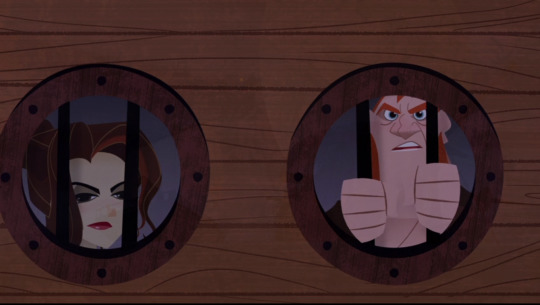
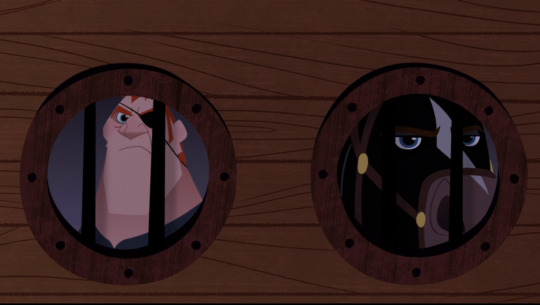
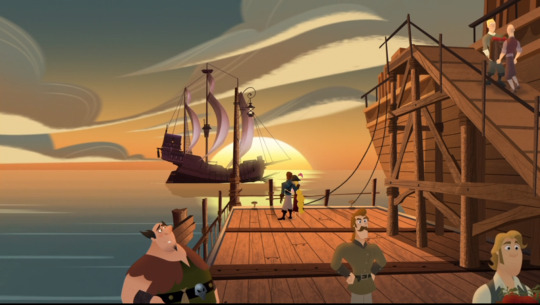
As previously mentioned, season two needed an ongoing external conflict. Anyone of the villains on the ship could have been the main antagonist of the second half of the season. Just have the person in question escape in the confusion, or overthrow the new crew of the ship a second time. Then have them show up later looking for a fight.
My money is on Lady Caine, but the Stabbingtons or Weasel could have done just a well. Caine wants revenge on Rapunzel. The Stabbingtons are after Eugene. Weasel wants power and riches, so capturing the princess and holding her for ransom could have been a goal. Then have them learn about this hidden power then voila you gotta a set up for a race to the end of the quest.
You also could just picked an underling at random and then elevated them to main villain by giving them a good goal and a backstory.
Also finally, Andrew and/or Varian, we’re options that they could have added in here. Varian more so than anybody else as he already has reason to go after the moonstone because his father.
Heck, you still could have added Varian and not made him the villain if you didn’t want to. This could have been the start of his redemption arc instead, and one of the previously mentioned villains,a Brotherhood member, or one of Zhan Tiri’s Disciples could have still served as the main antagonist.
In short, most of the problems with Tangled’s story are really easy fixes and the writers had multiple options at their disposal that they didn’t take. Which is just further evidence to last minute rewrites and Chris and Ben’s missamangment.
Conclusion
I enjoy this episode because it’s one of the few to tie back into season one, but it’s is a missed opportunity and it is a shame that it went nowhere.
#tangled#anti-tangled#lady caine#anti rapunzel#anti cassandra#eugene#max#tangled the series#rapunzel's tangled adventure
68 notes
·
View notes
Text
The world is cruel and unfair. My thoughts about the end of SnK.
This is a post about my feelings re: the end of SnK. I try to mix a bit of analysis and express where, in my opinion, it went wrong.
I’ve only read the last chapter once for now. Managed to avoid every spoiler until the official release. What can I say? I think this ending is disappointing and unsatisfying, despite not being The Worst Thing I’ve Ever Read. It’s serviceable at best, which by default is underwhelming in a work that has almost always tried to go above what we usually see in comparable pieces of fiction. Over almost 140 chapters, SnK offered its readers genuine emotions, either positive or negative, and, until this final chapter, managed to stay true to its themes. But this final chapter is basically a 4/10 or 5/10 ending in an overall 9.5/10 story.
I hope that, after the initial shock of the ending, I’ll be able to look back on it, not fondly, but with a bit more appreciation for some of its (too few) genuinely good moments. I also hope it won’t sour the experience of reading SnK too much for me. Of course, I accept the ending, I accepted it literally the moment I read it even though I saw it go further and further from my expectations and understanding of the story by the second. And obviously, I respect Isayama as a writer and genuinely cherish some parts of this manga.
But I won’t ever think this ending was good, and am going to try to explain why.
First, something quite subjective. I think the chapter lacked genuine emotion. I didn’t feel much of anything, except a crushing sentiment of sadness and a bit of anger when I saw Mikasa alone by Eren’s grave at the end. A lot of what happened felt either incomplete or forced, and often both. For example, I had imagined the moment the curse of Ymir broke would be the most beautiful moment in the manga, but instead it just... happened? This was supposed to be the peak of this story, the miracle that all these terrible sacrifices were made in the name of. I keep thinking about the moment the curse breaks at the end of Fruits Basket (a great read btw) and how genuinely emotional this chapter is even though the genre is different from SnK’s. Considering Isayama’s talent when portraying emotions, I can’t help but feel terribly underwhelmed by his version of this moment, which should have made us feel like everything was worth it, but didn’t.
Second, the pacing in this last arc (and especially post 123) was messy. I know it’s easy to criticize as a reader, but objectively, spending 7 chapters on the alliance going from point X to point Y and not giving the main character the spotlight he deserves is a major mistake. I kept holding hope that all of the buildup since chapter 130 was going to amount to the last 2-3 chapters slapping extremely hard (like, say, the Grisha-centered chapters in return to Shiganshina, or the Reiner-Eren conversation in Marley), but for the first time, Isayama disappointed me in that regard.
While mostly uninteresting fights got dragged out, some plot points were almost forgotten. Some setups never got a proper conclusion. Eren barely got the time to explain his motivations or what he saw. Historia’s conversation from chapter 130 never got an ending. The parasite and Ymir literally disappeared even though they were the focus of the last two chapters before this one. Some memory shards went unexplained. We never got to see Grisha’s death even when this panel exists?
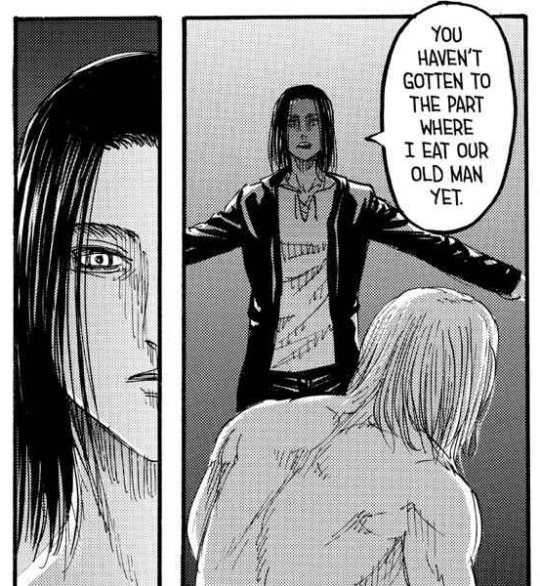
Regardless of the actual things I don’t like in the ending, I think it would have been more palatable if this last stretch of chapters had been given time to breathe, if only to expand on the characters’ motivations or give us more interactions (for example, Eren’s talks with Annie, Reiner, Connie...).
Third, characterisation and themes. Oh boy. My favourite character is Eren, and my other favourites are Mikasa, Armin, Reiner and Zeke. I think that among these five, the only one who got a true, complete character arc was Armin (and arguably Zeke as well, though the lack of resolution between him and Eren is a hate crime towards me, specifically). Reiner had a great character arc overall but his last appearance in the manga was distateful and a regression. I won’t expand on it.
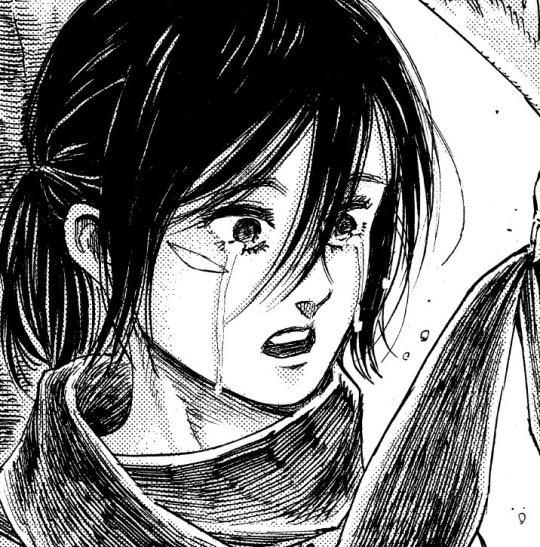
Mikasa... my poor girl. My most charitable take about her ending is that Isayama wanted to portray her inner strength, the fact she can always live on in the face of adversity and cherish her own life despite the setbacks while remembering those she loves. Well, I guess he succeeded. But in a weirdly unsatisfying way, because this renders her character arc entirely cyclical. Those qualities have characterised Mikasa since the start. It’s established since the very first arc that she’s prideful, brave, and that she has the inner strength to live without Eren if he ever disappears from this world. But the way Isayama made it happen? Having her kill him and then cry next to his grave in the final panels of the manga is what her arc amounted to? I had always hoped that Mikasa could actually save Eren from himself and show him how to live and share his burdens with him (all things that have been foreshadowed in the manga itself, btw). I thought her tattoo would hold some significance, either by
A/ being transmitted to her potential child with Eren were he to survive (didn’t happen)
B/ foreshadowing a future political role for her as a bridge between Hizuru and Paradis (didn’t happen, and furthermore she’s the only alliance member living in Shiganshina and is deliberately separated from the rest of them)
C/ having some kind of supernatural power that would allow her to change the game, were she to enter paths or reach the coordinate (didn’t happen).
So what? In the end, Mikasa’s Big Choice amounted to giving up on her love (but also not really because she’s never going to be able to move on and isn’t allowed to feel anything else but pain), resulting in her losing her family for the third time and never being able to welcome Eren home. This is horrifyingly sad. I’m also frankly disturbed by the sort of ~parallel Eren establishes in this chapter between Ymir and Mikasa, about the topic of love. So the message of SnK was that... love is a chain? Everything happened because Ymir was too attached to the King and couldn’t leave this world, so Mikasa had to show her that she could give up on love for the greater good by killing Eren? I wish I just misunderstood this but that’s what I got from the chapter and I hate it. Also, I really thought Isayama was above the traditional “female character who sacrifices everything and never reaches happiness but stays quiet and endures for the common good” trope. I was wrong.
Mikasa might have been the centerpiece of the story, but she got the short end of the stick. At this point, the writing pretty much does the opposite of what it is supposed to by inadvertently justifying the validity of Mikasa and Eren’s “selfish” dream in chapter 138. Initially, I thought that their dream was wrong and not something truly enviable because in it, they led a life of guilt and regret while knowing full well that Eren would end up dying anyway, leaving Mikasa behind, alone. Naively, I thought that surely choosing the responsible path would be more rewarding for Mikasa, one way or the other. But as it turns out, the path of selflessness also led her to a life of solitude, except now she carries her burdens all on her own without having tasted happiness. Amazing. I genuinely do not know how I am supposed to root for this.
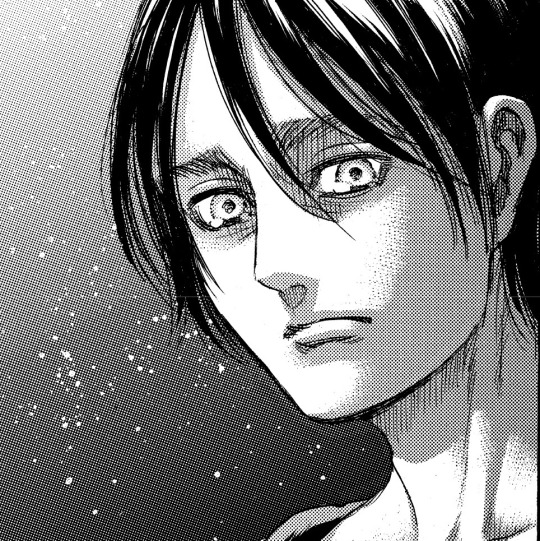
Finally... Eren. Oh boy. Oh, good lord. I’ll admit I wanted him to live, but I was also ready to accept an ending where he dies. But... not like this. I already said I don’t like the fact Mikasa killed him, but what I like even less is the lack of general resolution his character received. He’s the MC for god’s sake! But post-chapter 123, he has received second, if not third-grade treatment, save from chapter 131, which was brilliant.
Overall, his motivations are a mess, which I get. Him getting confused because of all his powers and memories is understandable. Him having conflicting motivations is actually appealing to me. He wanted to save Eldia, but was also disappointed in the outside world (when he says “I would have done it anyway”, I thought about what he said to Ramzi and the "scenery” in 131) , and wished for his friends to become heroes. I get it, it’s fine.
But Isayama went too far with the tragic aspect of his character. As in, there is no catharsis, just crushing pain. Isayama deliberately went overkill by stating that Eren killed 80% of humanity (what the hell), and, even worse, actually drove Dina to Carla. I literally couldn’t believe this. I have seen people theorize about this months ago and immediately discarded it by thinking it was ridiculous and amount to character assassination. To make things clear, I’m not discussing Eren’s actions in the last arc from a moralistic point of view, because this would be another topic entirely, I’m talking about what makes sense in the narrative that has been presented to us since the Paths chapters started and Eren’s plan was revealed. For example, however awful the contents of the scene was, Eren manipulating Grisha to kill the Reiss family was not only amazingly written and drawn in chapter 121 but also narratively motivated by the fact he needed the Founding Titan’s power. This scene also had other functions, such as revealing the Attack Titan’s premonition powers or making Zeke interact with Grisha and understand the truth about his father. Compared to this, the “moment” we have in 139, this abrupt, absurd revelation about him indirectly killing his mother is rushed and nonsensical. Even if this was to kickstart the whole story by awakening his hatred for the titans, I can’t help but feel shaken by how... gratuitous a “plot-twist” it is. What does it say about the attachment Eren had to his mother and her words to him? (”because he was born into this world”). This nullifies one of the most impactful scenes of the manga, because the ending makes it clear that in the end, existing as a human being by the simple virtue of being born wasn’t enough for him. It just couldn’t be, for some reason that I’m yet to fully understand. Instead, he endured and endured, and never got to experience the simple, humane existence Carla wished for him. So were these beautiful words a lie all along? Why did Isayama go to such an extreme with Dina? The only conclusion I can come to is that it’s because he needed Eren to be absolutely, totally irredeemeable. Eren needed, storywise, to be this unstoppable extremist who would get burned to ashes by his uncontrollable desires.
Because yes, apparently, Eren had to die. There was no escape. Worst of all, Eren died a slave. A slave to his desire for freedom. A slave to the destiny he saw at age 15. A slave to his titan powers. This is what I truly can’t forgive about this ending. I won’t stand for the “but he chose this” answer, because it was a choice made out of despair, and all the alternatives are presented as non viable by the narrative (are they really though? or is it just a cope-out to justify the last arc of the manga unfolding as it did?). In short, Isayama justifies this “choice” that was forced on Eren by telling us: his life was destined to be short, he had a violent side he just wouldn’t repress, Mikasa didn’t give him the answer he wanted, he was overwhelmed by what he saw, and their enemies were zeroing in on them. Canonically, all of this made him start the Rumbling. Fine. But I always thought that, at the end of it all, even if Eren were to die, this narrative would be challenged. That Eren would at least have a big cathartic moment, and that he would make another choice upon realising that the freedom he looked for was illusory, and that he would fight to the bitter end for what was right, what he truly wanted, before finally either going to rest or living on with the burden of his actions but the support of his loved ones. I wished for the perfect blend of bitterness and hope. The tragedy of irredeemeable actions completed by the powerful liberation of free will. The idea that change is possible.
But what did we get instead? Eren reaffirming that the Rumbling would have happened anyway while feeling tremendous guilt, as usual (living a life with regrets, and consequently, a death with regrets), refusing the support Armin was ready to lend him (refusing to even try to defy what he thinks is his destiny and pushing others away again) and erasing the memories of all his friends after having manipulated them into ending him against their wishes (going against the most basic concept of freedom). And because we as readers and he as a character have to suffer until the very end, Eren finally clearly expressed his wish to live, to stay with Mikasa and his friends. Only to die 5 pages later, for good.
The main character of this story truly died as a disembodied head, in a titan’s mouth, killed by the person he loved the most before being buried in a nameless grave. One of his mottos was “fight”, but in the end, he didn’t. He let fate happen. In a story about freedom, this is unfathomable. This is beyond the realm of sadness for me, and I’m leaning more and more towards indignation. Where was his dignity as a character? I know that Mikasa, Armin and the others know “the truth about him” but I’m sorry, this isn’t enough. Now, if I ever get the strength to re-read SnK, I won’t be able to look at Eren without thinking about all the things he sacrificed: love, friendship, happiness, humanity, morals, principles, justice, freedom, the lives of countless others, the peace of mind of the person he loves, and his own life. A sacrifice so great should have gotten us a reward as great, if not greater. But we only got the end of the titan curse, without even an apparition or a word from Ymir, the one who actually started all of this, and now Paradis is ruled by the Yeagerists or something. The wings of freedom defaced by two rifles. How great. How satisfying.
In the end, I can’t really fathom what Isayama wanted to say with this chapter. The story itself, the 138 chapters that preceded it seemed clear to me. The world is cruel but also very beautiful. But after having read 139, I don’t know where the freedom the characters chased is. I don’t know why love was portrayed as something so precious but also something that in the end was predestined to be discarded. I don’t know why characters such as Mikasa went against fate only to be crushed by it further down the road.
I never thought that SnK would go into this almost grimdark direction, but it did. I can barely find the beauty in this chapter. Mikasa’s last panels are heartbreaking, but even the strength of her love can’t shine through the countless sacrifices the characters - and especially she and Eren - made, for the sake of a future that already seems extremely compromised. I guess that all in all, the world’s cruelty overshadows everything, and those who make the greatest sacrifices also are those who never get repaid. The world is unfair. I know that, but it was my naive wish that reading a piece of fiction would help me take my mind off this reality by showing me there is also more to it.
PS: the best moment in the chapter was those panels:

Finally, even if it was too little and too late, someone showed Eren he wasn’t alone, and didn’t need to be. RIP, my beautiful boy. You truly did deserve better than what this story allowed you to be.
#SnK#SnK 139#Armin Arlert#Mikasa Ackerman#Eren Yeager#Eren Jäger#I don't really expect anybody to read this but I needed to write it#I don't know what to feel about this#mostly because I don't feel much#that's the problem#I just feel like I've been robbed of a satisfying ending#The art is beautiful and some of the dialogue hits but#I can't be happy with this#the last words of SnK are just a repeat of chapter 50? why does it have to be so underwhelming#while it could have been so beautiful#also pet peeve: Eren and Mikasa not even being able to share a real hug once in this series is a robbery of epic proportions#anyway#I'm done now i think#goodbye SnK it was a pretty nice 11 months#now onto other things
12 notes
·
View notes
Text
Why SDR2 is the best Danganronpa Game
If you’re a Danganronpa fan you probably have personal favorites whether it be characters, class trails or the topic of this essay favorite games. Despite all of the games having the same formula they still have a distinct identity from each other which is commendable but alas that’s not what we will discuss. In this essay I will explain why Danganronpa 2:Goodbye Despair is the best Danganronpa game.
Let me discuss the setting of the game Jabberwock Island. Immediately the tropical island serves as a stark contrast to the two schools of the trilogy. This isn’t just for show either while the schools are claustrophobic Jabberwock Island feels like an open space which makes the world more fun to move around in. Speaking of contrast in Danganronpa 2 each island does a good job of feeling distinct from one and another. When you get more floors to the school in the other game you do find interesting things. I especially like V3’s Talent Development Labs compared to the islands of SDR2 it’s no contest. The other games take place in a school and thus are limited to things that would logically be in a school were as you’re allowed much more freedom with the islands. From the bright and colorful amusement park of island four to the futuristic setting of island five there is no doubt that SDR2 has the most creative and diverse setting of any of the Danganronpa games.
Another thing that SDR2 executes well is feeling like a true expansion of the themes of DR1.Unlike V3 SDR2 plot is directly affected by the plot of DR1 without feeling like a rehash which can be difficult to pull off. I think the virtual world is an interesting concept that is executed quite well. Let’s use Chiaki as an example: the twist of her being an AI is foreshadowed with her direct similarities with Chihiro and Alter Ego. While not being overly obvious if you take a look at their designs they do share a lot in common. There designs both include a white button up shirt,similar bowties, an overcoat, a skirt with black stockings, along with similar shoes and haircuts. Once you spell it all out the design parallels become pretty obvious but they also share similar personality traits Chihiro they both share a love of gaming even though Chihiro isn’t as explicit about it. They also have a very sweet and well meaning personality along with a certain degree of intelligence which in Chiaki’s case is very analytical in nature which reflects her nature as an AI. There’s also some information in her free time events that foreshadows her nature as an AI which furthers her alter ego parallels. During one of her free time events she didn’t know that cows made milk which is basic human information and in a later free time event the only genre of games she’s bad at is dating sims which directly involves human connection as it’s primary gameplay mechanic.
That’s enough about Chiaki for now let’s discuss another character that uses parallels to another character that uses character parallels to great effect Nagito Komeda. The Makoto parallels are pretty obvious but let's still go over them starting with his design and also the fact that Nagito Komeada is an anagram of Makoto Naegi. Both characters wear a hoodie,have a similar haircut including the patented anime protagonist ahoge and his generally unremarkable design makes the Makoto comparisons clear. Were the parallel really shine however is in personality. During the early game the Makoto parallels are effective are used to create a false sense of security. During the early game he spends a lot of time helping you out and general doesn't come off as a bad person even if he does come across as a bit odd. This makes him an effective wolf in sheep's clothing. Even after revealing his true nature the Makoto parallels only grow stronger. Let’s take a look at both of their talents and how they operate in the narrative. Despite having the same title of The Ultimate Lucky Student there talents operate very differently. Makoto’s luck while powerful in it’s own way primary is used to keep him alive with conscience that make sense due to his talent. On the flip side Komeada’s luck is truly supernatural and he relise on it for his plans to work like when he used the random raffle to get himself on cleaning duty. Even though his luck is powerful it does come at a price. During his free time events he is revealed to have a cycle of luck where bad luck is preceded by good luck and vice versa As an example Komeda has said that he was kidnapped and then immediately found a lottery ticket that was worth ten million dollars Komeda’s luck serves as a powerful force of nature that is even beyond his control which is a real interesting subversion of Makoto’s luck. Another parallel is Makoto’s humility versus Komeada’s self deprecation. They both stem from the fact that they don’t see themselves as having worthwhile talents. Makoto sees himself as mundane compared to the exceptional people at Hope’s Peak Academy but he learns to overcome that insecurity and recognize his own value. Komeada on the hand sees himself as inherently worthless because of his lackluster talent and is willing to sacrifice his own life for the sake of the other ultimates Despite him seeing himself as worthless that couldn’t be further from the truth in fact he’s one of the most intelligent characters in the series but he refuses to acknowledge himself because of the way he see himself as worthless. Another thing the two characters have in common is the desire for hope but there methods are very different. Komeada like the founders of Hope's Peak sees ultimates as the embodiments of hope and he wishes to sacrifice himself for them and is willing to become the adversity they overcome and is willing to kill just so that he can become an obstacle that hope overthrows. Makoto is comparatively simpler in this regard and only becomes a symbol of hope because of his undying optimism and becomes known as the Ultimate Hope because of the adversity he faced and his ability to inspire Komeda also tried to become the Ultimate Hope by killing all remnants of despair including himself. This is a somewhat sound motivation however it ignores to hope of recovery and the ability to create their future. Speaking of hope for the future, let's talk about SDR2’s ending because it does a good job of thematically tying into Trigger Happy Havoc. It’s revealed that the world is a virtual world created by a The Future Foundation which was created by the survivors of DR1. The purpose of this world was to reform the sixteen students from the game which were revealed to be remnants of despair. This explains the nature of Monomi and the seeming peaceful beginning of the game however this turns into a killing game because of AI Junko. Let’s address the most common complaint about this finale which is that Junko was overused and this game should have had a new mastermind which is a fair complaint however if you consider the fact that SDR2 was created as a direct continuation of DR1 it works thematically for Junko to be the mastermind and it was a satisfying conclusion to finally kill Junko excluding the anime because the anime doesn't deserve rights. The Future Foundation also helps continue the story of DR1 due to the fact that we get to see these characters again in a way that furthers the plot. The new finales use’s characters from the previous game however it adds a different theme that feels natural with the theme of being able to change the future regardless of the past. This isn’t something that the survivors of the first game had to deal with because of the SDR2 survivors' unique situation of being remnants of despair. This while different is still a fundamentally optimistic theme so it feels thematically consistent with the themes of hope and despair from the first game
As I hope I’ve made clear that due to the thematic parallels of DR1,SDR2 is a true sequel that expands on the thematic elements of the first and becomes something greater than its predecessors.
#sdr2#danganronpa#dr1#danganronpa v3#Nagito Komaeda#chiaki namani#makoto naegi#chihiro fujisaki#junko enoshima#long post#jabberwock island
16 notes
·
View notes
Text
Cooldown: The Other Monster in Monster Hunter
I don’t remember which monster it was, but just mere moments after its introduction there was this sudden “Aha!” moment as this nagging feeling I’d been having during my early hours with Monster Hunter Rise finally clicked. My Hunter was staring out into the depths of Shrine Ruins as he shouted to his cohorts “Let’s do this!” and this mystery feeling I had been wrestling with before finally had a shape to it. While the nature of Capcom’s popular Monster Hunter franchise appears cruel to some, I think there’s something worth considering that could help add a layer of depth for those wary to give a try.
We are the other monster in Monster Hunter.
The Other Monster in Monster Hunter Rise
Allow me to explain. The launch of Monster Hunter Rise on Nintendo’s Switch this year was met with critical acclaim from both critics and fans alike in a landmark entry—recently shipping 7 million units worldwide—in the long-running Capcom franchise that was born decades ago on Sony’s PlayStation 2 in 2004. Soon after its release in late March, however, I noticed a familiar conversation had developed among a few online outlets over concerns of the game’s main hook. Calling itself Monster Hunter leaves no surprises, and for some it evokes an uncomfortable feeling of relentless slaughtering. I think it’s worth considering the persistent theme existing throughout the series that depicts the monsters as something to be respected as much as they are feared. Because of this, nothing is wasted upon a kill, whether it’s in the use of new gear or vital materials to improve the lives of the community.
Still though, this discourse that surrounds the nature of the game seems to have persisted. Honestly, I get the feeling. I don’t think it’s unnatural at all to feel sorrow for the slain as you stand over them triumphantly. In Capcom’s defense, the monsters are endless—even the flagship monsters that adorn each game’s cover art—and the context behind the quests is often in the aid of the community under threat somehow.
Whatever your feelings may be on the subject, however, I don’t think it’s unreasonable for some to be put off by the context of these games. But my hope is for just one like this to find comfort in visualizing the Hunter in a different light. During my time with Rise so far, I like to think of the Hunter sharing a deeper connection to Monster Hunter’s world than as just a brutal killing machine.
My opinion? Hunters are no different than the rest of the monsters.
The Brain Thinks, The Limbs Fight, The Heart Races
I keep saying that, but what does it mean? So far it sounds like I’m only confirming those fears, right? But I don’t mean a monster in the tyrannical nature, but instead something like anything else you’d come across in Rise’s numerous quests.
In Monster Hunter Rise, players take the role of a Hunter within the village of Kamura, which has been bearing the brunt of monster attacks, all while a greater threat looms from the shadows. Like previous entries, you don’t have to take the task on alone. Palicos, the anthropomorphic felines of the Monster Hunter world, can be called upon to assist you in these hunts and provide numerous advantages in your quests. New to Rise is the Palamute, canine companions that are not only combat trained, but provide extra maneuverability to hunters allowing them to ride away from danger and climb to great heights much faster than on their own. The Hunter remains as the lead of the party, but this partnership is more ingenious than it appears on the surface.
In fact, I think it helps to illustrate the bigger picture: Hunters are not just mindless antagonists to the wildlife. On the contrary, one of Monster Hunter Rise’s fiercest monsters is the trio of Hunter, Palico, and Palamute and also one of many within the greater ecosystem. Each member provides a functional part and adds up to a greater sum to create something that as fearsome as any other monster.
First, take the Hunter, who provides advanced weapon handling skills as well as the vast knowledge of Rise’s bestiary necessary to topple each one efficiently. The Palico, meanwhile, provides crucial support when up against overwhelming odds. For example, think of some of the real-life animals and insects out there that have a defense mechanism—poison, quills, webbing, stingers. That’s the Palico. It’s the Hunter’s mechanism by way of laying traps and afflicting statuses to slow their target. Finally, the Palamute provides transportation and operates like a hidden hand to the Hunter, often distracting the monster so the other limbs can move in.
Working together as one, they create a unique and powerful team that’s awesome to observe and more so to be a part of it. One bout with the wily Bishaten and you’ll begin to appreciate the similarities these three share with the other monsters. When it comes down to it, they all rely on tails, claws, and whatever other tools are in their arsenal. The difference in appearance is merely for show.
Thriving in What Feels Like Home
This characterization only gets stronger as you take your first steps outside Kamura’s walls and into the Shrine Ruins, Rise’s initial area of exploration. It’s difficult to get a sense of these characteristics while spending time in the village, but this changes once out in the wild.
This is especially true for both Rise and its predecessor, Monster Hunter World, which first adopted open environments for players to freely explore, as opposed to individual zones from previous entries that loaded on demand. Quests are generally limited to a generous 50 minutes, and though you’re not likely to spend it all on one quest, especially given Rise’s ramped-up gameplay, it can be time well-spent gathering materials, studying the land, and engaging the wildlife.
But I think it’s in these two games where this extra time can be truly appreciated.
Like every other monster, Rise gives the player the opportunity to live on the terrain, if only briefly, and tap into the monstrous side of their crew. It’s the natural environment for a Hunter, where any restrictions fall away, and they can do what they do best. These moments are best illustrated by Rise’s soundtrack—lying still in the background while environmental ambience fills the void during gathering expeditions—before crashing in at the moment you’re spotted by something larger than yourself. After spending enough time out in the wild, Kamura begins to feel like a sanctuary from the dangers of reality. But that’s the most likely message, isn’t it? Any other monster has a place of security to retreat to, and Kamura certainly fits the bill for the Hunter.
The Titular Monster, Magnamalo, Stares Back at You
While the Monster Hunter series doesn’t necessarily dig down deep for a backstory to the player’s actions, it has been played around with here and there, while relying mostly on player actions. Rise is a more significant step this time around, with Capcom leaning on the tools provided by its in-house RE Engine to construct fun, if only a few, cutscenes to weave together enough engaging narrative in the single player component. Residents of Kamura have names as well as roles, and there’s a shared urgency to everyone’s efforts. Another one of those narrative elements is Rise’s flagship monster, Magnamalo, serving as something of a rival to the Hunter. You eventually tangle with it after a series of events foreshadowing the showdown, and the outcome serves as the game’s soft ending that leads into further adventures online with friends and strangers.
***Spoilers for Magnamalo’s fight***
I thought Magnamalo was a fascinating fight for several reasons, most of all because I saw things in this particular monster that wasn’t shared by others. For example, Magnamalo has a few characteristics that share an interesting similarity to the Hunter. First, we learn that it takes advantage of The Rampage, an event Kamura’s leader, Master Fuegen, alludes to as one of the greatest threats to Kamura’s survival. During these moments, several monsters siege the outer gates protecting the village in a coordinated attack. Magnamalo is apparently cognizant of this and is said to appear during these Rampages to feast on monsters, and we witness this ourselves as the story progresses.
Like Magnamalo, the Hunter participates in Rampages to acquire resources.
Upon coming face-to-face with Magnamalo for the first time, you may notice it fights with patience unmistakably like Hunters. Series veterans will be the first to tell you that best practice is to pay attention to what the monster is doing at all times in order to learn how to react. Magnamalo almost does something similar, choosing at times to fight at a distance, taking pot shots of energy released from its tail. It never seemed to be in a hurry until there was a sure opening.
In some ways, Magnamalo was like catching my reflection in the mirror. Our goals weren’t so unlike, and our methods were carefully crafted and considered. If Magnamalo, a monster, was like myself, how could I not be the same?
Don’t be Afraid to be the Other Monster
None of this is to say you can’t be uncomfortable with Monster Hunter.
I can understand people drawing real-world connections to the gameplay of Rise, I just wouldn’t take it that far myself. I can only take the context of the game and view it in my own perspective, and rather than concluding Hunters as sadistic, I choose to see them through the same lens as a creature like Magnamalo and the many others like it.
There may be other ways to help contextualize these games, I would welcome it. I think a counterpoint could be made from hunts never being depicted as sport, but, Arena Quests, admittedly, are hard to overlook considering these take monsters out of their natural environment. I can chalk that up to it being a video game—of course there’s challenges to do the thing as quickly as possible—and there’s numerous other things Monster Hunter does to gamify the experience all things considered.
I would like to see people try to crack that one. In the meantime, I’ll continue to believe, as I did in that moment on the Shrine Ruins cliffs, that we’re simply the other monster in Monster Hunter. Not a blight on nature, not an unfeeling killer, but a rival in a competitive environment for survival.
3 notes
·
View notes